SUNDANCE RESPONSES  Tuesday, January 26, 2010
ME TOO |
co-writer-co-director, Alvaro Pastor
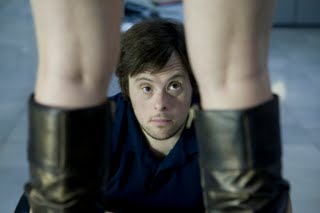 [PREMIERE SCREENING: Tuesday, Jan. 26, 9:00 pm -- Egyptian Theatre, Park City] We made lots of hard decisions making Me Too. I think, in fact, directing is making decisions all the time. For both of us, me and Antonio Naharro, the hardest one was to ask for the real Pablo Pineda to play Daniel on this film. It was difficult because when we realized that nobody else could play this role we had no choice. In fact the film couldn’t have been made without him playing this kind of alter ego of himself. How it affected the film? Well, the film was mad and the work with him was so amazing and surprisingly easy that you could never imagine the film without him. For me it was also difficult to decide if Antonio, the co-director of the film, was the best option for playing Daniel’s brother. Not because his quality as an actor but it could be very hard to work together as director and actor sharing decisions all the time. It was our first time doing that and finally the choice was good in spite of this issue because [it made] us a little bit crazy sometimes during the shooting.
# posted by Jason Guerrasio @ 12:00 PM
LOUIS C.K.: HILARIOUS |
director, Louis C.K.
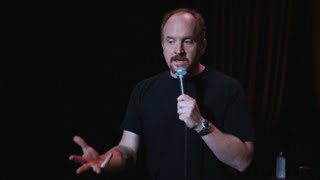 [PREMIERE SCREENING: Tuesday, Jan. 26, 5:30 pm -- Library Center Theatre, Park City] The hardest decision was the location. I had to choose between Boston, Milwaukee, Cleveland and Minneapolis. The criteria was that I needed a theater that I could sell out twice in order to shoot two performances. Those were the cities where I was selling tickets the fastest. Minneapolis has great crowds but the theater is white and kind of sterile and the audience is separated from the stage. Cleveland is great but the show I had booked there was a little too late in the year. I wanted to shoot this when the material was peaking. By Cleveland, it would have gotten stale. Boston is my hometown and the Orpheum Theater, where I played in Boston, is a gorgeously disgusting old place where rats have been known to come on stage during shows. But it’s 2,600 seats and that’s a lot of tickets to sell twice over. Milwaukee won because it’s a worn-out old place with a long history dating back to vaudeville, but it’s also snug and intimate. We sold many tickets there very quickly. I don’t have much personal history with Milwaukee but I’ve played there throughout my career and always found the crowds to be a perfect mix of people who are very ordinary and yet up for going anywhere I felt like taking them. In any case I agonized over the location a lot because that one decision impacts every frame of the film, which takes place in only that location.
# posted by Jason Guerrasio @ 12:00 PM
ALL MY FRIENDS ARE FUNERAL SINGERS |
writer-director, Tim Rutili
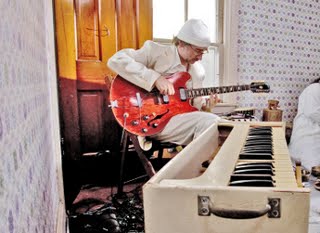 [PREMIERE SCREENING: Tuesday, Jan. 26, 9:00 pm -- New Frontier on Main, Park City] The most difficult decisions on our film were made in the editing process and had to do with balancing music, tangent and story. We had one scene in particular that looked great and had a really good friend of mine and her son acting in it. Everywhere we placed the scene in our movie seemed to throw it out of balance or clutter the narrative. The last thing I wanted to do was lose some of those shots, and I especially didn’t want to cut my friend and her kid out of our film. We tried everything and the only thing that worked was to choose to serve the story and lose the scene completely. I called my friend as soon as I knew and told her she was cut from the film. I half expected that she would be upset by our decision but she was gracious and kind about it and didn’t kick my ass.
# posted by Jason Guerrasio @ 12:00 PM
ODDSAC |
director, Daniel Perez
 [PREMIERE SCREENING: Tuesday, Jan. 26, 8:30 pm -- Prospector Square Theatre, Park City] Deciding not to do a tour documentary on the band, which was what was first proposed. I have strong feelings about the distance between performer and audience, and I didn’t want to contribute anything more to this gap. I wanted to make something that I would be psyched to see and here it is. That and deciding which kid to kill in a scene were pretty difficult. In the end it was a combination of his hair and fake blood that did it.
# posted by Jason Guerrasio @ 12:00 PM
RUSSIAN LESSONS |
co-director, Andrei Nekrasov
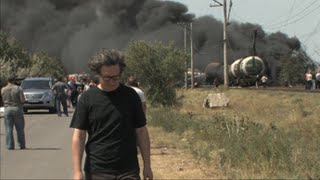 [PREMIERE SCREENING: Tuesday, Jan. 26, 9:00 pm -- Temple Theatre, Park City] The most difficult decision was the one to expose the mistakes of fellow film and TV program makers. The related question is why I decided to do it. There were two reasons for that. Firstly those mistakes were instrumental to the justification of an unjust war; secondly in many instances there were grounds to doubt that those mistakes were innocent. In other words, those mistakes were probably lies. To me personally they were shocking because I’d seen with my own eyes what havoc Russian bombs wrecked in the Georgian city of Gori, while my colleagues passed those images of destruction, of dead and wounded Georgians for the Ossetian victims of the Georgian bombardment of Tskhinvali, South Ossetia. I happen to know the cameramen who shot the footage. It is almost impossible to believe that those mistakes were innocent as that footage was simply lifted from Georgian TV. But perhaps the most shocking thing of all was that the Western media, some of the most respectable TV networks in the world, followed the Russians down the same route. In my film I demonstrate the inaccuracies in the representation of the war in Georgia in the programs of the BBC and the German ZDF. I made three films for the BBC. I cooperated with the ZDF and appeared in its programs. I have friends who work in and for both organizations. So was the decision we are talking about difficult? You bet it was. But I don’t regret it. Because I want Russia to become democratic and the West to stay democratic.
# posted by Jason Guerrasio @ 12:00 PM
SOUTHERN DISTRICT |
writer-director, Juan Carlos Valdivia
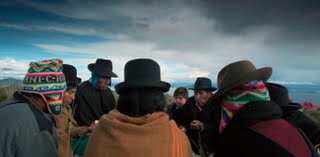 [PREMIERE SCREENING: Tuesday, Jan. 26, 6:00 pm -- Eccles Theatre, Park City] I chose to work with an ensemble of mostly non-actors in a choreographed and precise mise-en-scene that allowed little improvisation. I had become disenchanted with film and with filmmaking. I knew that only a strong element of risk could bring back my sense of wonder. What makes a story unique is not what you tell, but how you to tell it — and the choices you make are the core of creativity. We shut ourselves in a house full of mirrors with a revolving camera that observed everything — especially my troupe of inexperienced players. I wanted an atmospheric film with very natural performances. But at the same time I was looking for very specific nuances from characters I knew very intimately. The film has 57 circular sequence shots. There was no possibility to cut. Each take had to be perfect. Betraying this — cutting away to a reaction shot or an insert — would be equivalent to failure. The process took an enormous amount of concentration because the actors had no training and only the limited tools I gave them during rehearsal to get out of difficult situations. We didn’t stop production until the desired results were achieved, even if that meant retakes, reshoots and an extra week on a four-week shoot. I learned that silence, careful observation and working in an atmosphere of intimacy are the most important allies in the process of making a film that requires precision. Also creating a mystique and a sense of hope in the team, so they know that everything they do is important and possible. But above all, knowing exactly what you want beforehand, is essential. The decision to work like this and standing by that choice is what makes this film special. I think it works. And it made me believe in filmmaking as an art form again, which is why I started making films to begin with. To me, filmmaking is about creating states of mind, atmospheres and unique images that resonate emotionally and intellectually. The storytelling part is only what holds it together.
# posted by Jason Guerrasio @ 9:00 AM
TWELVE |
director, Joel Schumacher
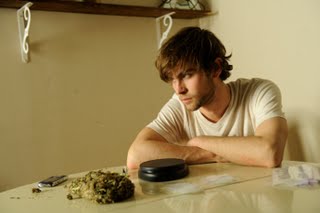 [PREMIERE SCREENING: Friday, Jan. 29, 6:15 pm -- Eccles Theatre, Park City] With our budget, we could only afford a 23-day shoot schedule on a complicated ensemble movie. At that time, my decision was, “Should we cancel the film or did I think we could do it in the days allotted?” I’m happy that we went ahead with production and, in the long run, our limitations and the pressures they added kept us on our toes and made for a better movie. I am very proud of our cast and crew, who worked under very difficult conditions to produce such a quality film.
# posted by Jason Guerrasio @ 9:00 AM
CONTRACORRIENTE (UNDERTOW) |
writer-director, Javier Fuentes-León
-797823.jpg) [PREMIERE SCREENING: Tuesday, Jan. 26, 3:00 pm -- Egyptian Theatre, Park City] Probably the hardest decision during the whole process of making Contracorriente was casting the lead role of Miguel. The story of Contracorriente relies completely on the shoulders of the main character and so I needed a talented actor that could be both strong and vulnerable, masculine and sweet, who wouldn’t shy away from playing a man in love with his wife and with another man and who would be believable in the role of a fisherman and leader of his town. I also wanted him to be Peruvian since the story takes place in a small fishing town in the Northern coast of Peru. For about three years before the actual shooting of the film, I had been discussing the role of Miguel with a great Peruvian actor who is also a friend of mine. He had read the script more than once and had not only fallen in love with it but given me extremely intelligent feedback regarding the character and his story, which I think is one of the best gifts a director can get from an actor. I knew that shaping the arc of such a complex character as Miguel would be one of the biggest challenges in directing Contracorriente, and so I was very happy with the idea of taking that difficult journey with a friend of mine who I could trust and not another actor I didn’t know whatsoever. When the film was green-lit I started right away to have casting sessions both in Lima and Bogota. While casting the other roles, I started to realize that I was more focused on finding actors who would fit my friend’s energy, complexion, age, etc., than finding the right actors for the different characters in the story. I was so intent on having my friend play the lead that I was forcing the whole story and cast around him and not necessarily in the best direction. It’s hard to explain what wasn’t working. Suddenly the energy, the chemistry in the main love triangle wasn’t working like I had envisioned. It had nothing to do with my friend’s talent or dedication; I still believe he is a great actor and would be lucky to work with him in the future, but it was becoming very clear to me that he didn’t fit the world I needed to create for the story. I almost went into a nervous breakdown, not only because all of a sudden I was finding myself without my lead weeks before shooting, but also because I had to tell my friend the truth. I hadn’t given him the role yet, but we had had enough casting sessions and conversations to know that it would break his heart. I decided to give up my hopes of having a Peruvian lead and started looking for actors everywhere. Finally I found Cristian Mercado in Bolivia, and suddenly the role of Miguel and the rest of the cast made sense. I told my friend that I had chosen another actor and I was very surprised by his noble reaction. He had worked with Cristian in the past and thought he was a great choice for the role. A year later my friend told me that it had been very disappointing for him but that later he had realized I had made the right decision. And I agree — it was the toughest decision, but it was the best decision I could’ve made.
# posted by Jason Guerrasio @ 9:00 AM
CANE TOADS: THE CONQUEST |
writer-director, Mark Lewis
 [PREMIERE SCREENING: Tuesday, Jan. 26, 9:30 pm -- Eccles Theatre, Park City] The easiest decision that I made with respect to the film was to film it in stereo (3D). In hindsight, this became the hardest decision as the creative and technical challenge was with us every single day and continues through the post and the exhibition path. The outcome, however, is stunning.
# posted by Jason Guerrasio @ 9:00 AM
Monday, January 25, 2010
THE VIOLENT KIND |
co-writers-directors, The Butcher Brothers
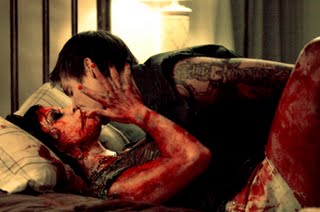 [PREMIERE SCREENING: Monday, Jan. 25, 11:30 pm -- Library Center Theatre, Park City] Trying to figure out the fake blood from the real while on set. We work pretty hard when shooting but also play equally hard. There were many nights when the cast and crew would celebrate and drink together after an intense day of shooting… let’s just say it was not unusual to have someone walk onto set the next morning bandaged and bloodied. The greatest part about it was that the FX department would shoot photos for documentation and use our own surly cast/crew’s random scrapes, bruises or hematomas as a model for the horror FX. True story.
# posted by Jason Guerrasio @ 3:00 PM
JOAN RIVERS: A PIECE OF WORK |
director, Ricki Stern & Annie Sundberg
 [PREMIERE SCREENING: Monday, Jan. 25, 9:00 pm -- Temple Theatre, Park City] Well let’s just say this, making a film about Joan Rivers was not easy. Phew! There’s Darfur, Afghanistan and then there’s Joan Rivers! Our producer Seth Keal reminded me of truly the hardest decision we had to make during the filming process. It came during the editing process when we were faced with whether or not to leave in the vagina fart jokes. It almost came to fisticuffs in the editing room, seriously! You think Obama had it tough when he decided to send in 30,000 additional troops into Afghanistan? Well nothing is as divisive as the vagina fart platform. Do you sometimes waffle on your position? It was tough in that edit room. We were decidedly, unwaveringly strong in the face of vagina farts. And then, several tequila shots later, we found ourselves deep in battle, and some were ready to switch sides… That’s one small example of the tough decision-making, the daily pain and anguish we faced in making the Joan Rivers documentary. You want to know if we decided to leave in the vagina farts joke? How it all ends? See the movie! Seriously, while our lives were never at risk making this film, we did face some challenges and hard decisions. One of the greatest challenges we faced when making a film about a pop-culture icon and a controversial legendary personality was confronting people’s preconceived idea of Joan Rivers. Joan Rivers’s persona has been widely exploited, so our task was to peel away layers to expose the self-driven, work-obsessed perfectionist. We devoted a lot of time to shooting Joan as she traveled throughout the U.S. and U.K. in order to capture her most unguarded moments and to find deeper meaning in what might otherwise be presented as a reality-television glimpse of a celebrity. For a 75 year old, Joan rarely has downtime, and that can make it hard to isolate the deeper rhythm of the film we were working to create. Filming Joan over a year, we were constantly making decisions about which new ventures might be important to the final narrative and then figuring out how to physically shoot her marathon days. We were never certain which possible job offer might lead to a transformative event and define the film’s narrative arc. We adapted the thinking to be of new parents who missed their baby’s first steps: if we were not there to see it happen, it did not happen. When Joan was scheduled for 24 hours in a northern Wisconsin casino, we looked at it as a small gig in the dead of winter in a remote town that required three flights just to get there. At the last minute we decided to send Charles Miller (d.p.) to cover the trip with Joan; we figured it wasn’t a big show and probably not important, but you never know… and then, the raw and unexpected footage of an audience member heckling Joan turned out to be an integral moment in the final film. The decisions on what to follow became the heartbeat that carries us along a year of reinvention in an unforgettable life. While much of Joan’s work this year could be taken at face value as entertainment, these unexpected scenes allowed us to construct a narrative that revealed Joan’s greater, more universal story — that of an aging performer, determined to succeed, in a business and culture driven by beauty and youth.
# posted by Jason Guerrasio @ 12:25 PM
THE IMPERIALISTS ARE STILL ALIVE! |
writer-director, Zeina Durra
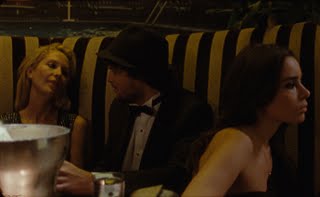 [PREMIERE SCREENING: Monday, Jan. 25, 12:30 pm -- Eccles Theatre, Park City] The hardest decision I had to make among a lot of crazy decisions was only days before we were meant to start shooting; a piece of financing fell through at the last minute and we only had enough money for the first three weeks of our 23-day shoot. It was also the end of January 2009, the heart of the financial crisis was breaking — a scary time to raise funds for a small indie film! I decided to go ahead since everything was planned, the team and actors put together, and if we stopped now I may never get to make this film, which I had waited so long to make. There would also be more pressure to raise the money if we were already shooting. During the shoot we had various meetings with prospective backers. One was a total sleaze, who, within five minutes of meeting me, asked whether I had been a “naughty schoolgirl.” I cut him dead with a resolute, “No,” knowing that we were definitely going to lose this man’s money. I was not going to appease some slimeball’s fantasies no matter how desperate we were for that backing. I went home thinking, “Could it get any worse?” Yet another example of the difficulties faced by women working in film. It was a phone call I made to an investor in the middle of a snowstorm (we were the only film shooting that day in Manhattan) outside a Chinese grocers that we were filming in, in the middle of directing a scene which had to be done in an hour because we would lose the location, begging him for the money and then negotiating new terms with our lawyers conferenced in that saved us. Thankfully we pulled through and obviously it was for the better as I made the film. However I hope I don’t have to through that again!
# posted by Jason Guerrasio @ 12:00 PM
COUNTDOWN TO ZERO |
director, Lucy Walker
 [PREMIERE SCREENING: Monday, Jan. 25, 11:45 am -- Library Center Theatre, Park City] There’s one thing that I learned about nuclear weapons that would make it so easy for terrorists to entirely destroy a city that there was a decision to make: Is it a good thing to advertise security vulnerabilities? Am I alerting responsible citizens to civilization’s scariest fault lines in order to demand enlightened leadership to make the world a safer place, or am I giving terrorists their best ideas and causing the deaths of millions of people? It’s not hard to build a nuclear weapon. It’s not beyond a group of a dozen middling grad students, and you see that in the movie. But I found out how one person could blow up a city with their bare hands. And I had to decide whether to include it in Countdown to Zero. How To Blow Up New York was a working title for the movie, and I admit I liked it, although I understood why it had such a short half life among the rest of the above-the-line crowd. And just in case you’re confused, I don’t really want to blow up New York. On the contrary. Robert Oppenheimer, father of the atomic bomb, recalling the first ever nuclear test, quoted the Bhagavad Gita: “Now I am become Death, the destroyer of worlds.” It’s not something I ever want to say about my work. On the contrary. I think about professional pride — my own, and how it might compare, say, to that of a wartime nuclear scientist at Los Alamos, or to that of a terrorist today. Sometimes I’ve chosen not to include some of the best scenes in my movies — the ones that would really juice up my career, like the most outrageous scenes of Amish kids doing crystal meth (I’m talking about my first film Devil’s Playground, which also premiered at Sundance). I try to adhere to my own Hippocratic oath, and to make sure that my films first do no harm. Non-maleficence in filmmaking means not including scenes that would endanger people. Einstein said he made “one great mistake” in his life when he wrote to President Roosevelt to urge the development of nuclear weapons. Nuclear weapons are not things you want to make mistakes about. But if you don’t tell the truth about a problem, who’s going to fix it? And when I make documentaries I feel a tremendous responsibility to the truth. So how much information about nuclear danger is too much information?
# posted by Jason Guerrasio @ 12:00 PM
JEAN-MICHEL BASQUIAT: THE RADIANT CHILD |
director, Tamra Davis
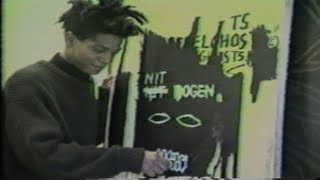 [PREMIERE SCREENING: Monday, Jan. 25, 3:00 pm -- Temple Theatre, Park City] All the decisions that I thought were hard choices seem so obvious when I look back. While making my documentary I wrestled with the idea of putting myself in the film. I felt awkward studying this idea. I didn’t want the film to be about my personal journey but about the story of my subject, Jean-Michel Basquiat. Now when I watch and show the film I see that the personal texture I added has become one of its strongest narrative elements.
# posted by Jason Guerrasio @ 12:00 PM
FREEDOM RIDERS |
director, Stanley Nelson
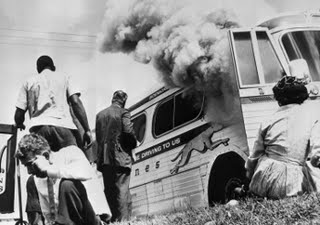 [PREMIERE SCREENING: Monday, Jan. 25, 6:00 pm -- Temple Theatre, Park City] I think the hardest decision for us among many hard ones was to make this film without narration. This had an impact on every aspect of the filmmaking and upped the “degree of difficulty” by a factor of 10. But it finally was a great decision because the story is now told largely by those who participated in the Freedom Rides. It became their story and not a story about them.
# posted by Jason Guerrasio @ 12:00 PM
THE EXTRA MAN |
co-writers-directors, Shari Springer Berman and Robert Pulcini
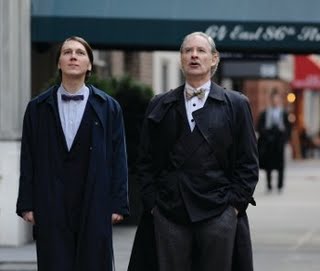 [PREMIERE SCREENING: Monday, Jan. 25, 9:30 pm -- Eccles Theatre, Park City] Long before the cameras rolled on The Extra Man, we faced a decision of Sophie’s Choice proportions: whether or not to sign off on an impossible production schedule or pull out of the movie completely. We had expected to make the film on an incredibly challenging 30-day shoot. However when everything was budgeted out, we were left with only 27 shoot days, a rather extreme difference. When our a.d. nervously handed us this document, there were many days that were literally unmakeable. No matter how quickly we moved, how minimally we designed our lighting or how limited we planned our coverage, there simply weren’t enough hours in the day to accommodate the work. While we endured a similarly short schedule on American Splendor, that movie wasn’t set in posh Manhattan locations, and it was also a considerably shorter screenplay. Still that experience was terrifying and exhausting — a situation we hoped we’d never have to face again. Despite this 27-day dilemma, so much of preproduction had fallen into place: the locations, the amazing cast and the wonderful crew that we were fortunate to have assembled. In the end, we decided that if we could get one more shoot day, we could pull off the impossible by viewing our script as a living organism — -one that would have to change and adapt with each day’s challenge. We also convinced the producers to budget a second camera for many of the hardest days. This allowed us to shoot a variety of angles simultaneously which saved time. Since our cast was comprised of actors with major theater experience, they actually preferred this more natural way of shooting. We also beefed up our second-unit days to include key plot moments with our actors rather than just the requisite beauty shots. This gave the entire production a breathless pace and an energizing momentum, but it also turned the set into a potboiler of tension. Certainly our coverage suffered and it was a less than ideal environment for the actors and crew, a situation no director wishes to inflict on these hardworking people. But in the end we won our campaign for that extra day, which eased the pain a bit. And because we chose to move forward, we actually got The Extra Man in the can rather than having it end up as yet another sad story about a production falling apart.
# posted by Jason Guerrasio @ 12:00 PM
SON OF BABYLON |
writer-director, Mohamed Al Daradji
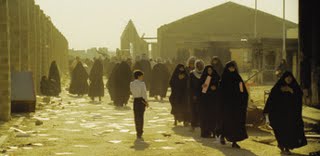 [PREMIERE SCREENING: Monday, Jan. 25, 6:00 pm -- Egyptian Theatre, Park City] The hardest decision I made on my film was with the casting. My style of working and telling the story often means working with non-professional actors. The main character of the film is a mother who goes across Iraq with her grandson, searching for her son who has been missing for 12 years. My aim was to search for people who had this experience; I searched for six months in villages and cities in Iraq. Eventually I came to a small village of about 300 homes, and each home had a story about missing people from their families. Knocking on doors and hearing the mothers’ stories of their missing husbands, fathers and sons was heartbreaking; after awhile I knocked on a door and found my main character. Looking into her eyes I saw that she could be the woman I was looking for; I discovered she had been put in prison twice for political reasons, over five years in total and whilst in prison she lost a child. She also lost her husband who she was never able to find; he had been taken to a prison when she was in prison herself and she never saw him again. For 20 years of her life she searched for him and had the same experience as my main character. I felt she would be the right woman to tell this story with me, but it was very difficult as it was so emotional for her and for us, that maybe I would lose my direction in the emotion of the situation with this woman. Working with this woman during filmmaking, I learned more about her story: Her brother was hung in the street and buried in an unknown place. This woman dedicated a year of her life to find her brother and give him a proper burial; she recovered his body and smuggled it away from the unmarked grave herself, to let him rest in peace. Locked somewhere between her character and her memories for eight hours, her character searches for her missing son but as she plays this role she begins to relive her own experiences. Going through this experience with her we were all helpless to ease her pain and felt it all ourselves. I had to wonder in this moment if I had made the right decision to work with this woman because now we were causing her to relive her pain and suffering. And this was affecting all of us as we began to recognize the pain of own mothers, aunts and sisters. I began to think I was inhuman for putting everyone through this. Perhaps the reality of the situation is too real and too present to tell honestly at this time. We took two days break after this scene before we went back to work. As filming concluded I had the chance to learn more about this woman. She had been a witness against Saddam during his trial, but she said to me, “Mohamed, even with all my experiences I don’t want revenge, not anymore. If you can find it in yourself to forgive we should. This is how Iraq will move on.” In the edit when we saw her performance, I thought about my doubts, and I realized she had given us such a genuine and moving performance. Only someone with that experience and humanity could provide that, and I felt it was the right decision, even though a hard one.
# posted by Jason Guerrasio @ 9:00 AM
SKATELAND |
co-writer-director, Anthony Burns
-727925.jpg) [PREMIERE SCREENING: Monday, Jan. 25, 5:15 pm -- Racquet Club, Park City] Making a movie is never easy. In fact much of the entire process is just continuous problem solving. With the right amount of preparation however, many unforeseen issues or setbacks can be avoided. In our case, Skateland was written and completely shot out in eight months. We went from a blank page in April to a wrap party at some colorful bar in Shreveport, La., by December with about a hundred new friends and co-workers. My point is we stacked the odds against us. The shot list was ambitious and needed to be completed in 30 days (five-day weeks). This is an independent film but we wanted to make it feel and look like a much larger studio film. A feasible goal, but time was not on our side. We had to get it now or not at all. So we pushed everyone, blew through a quick preproduction and were taking celebratory shots 240 days later. Next time give us two to three weeks more prepro, five extra days of production and a month longer on the script. On Skateland we didn’t have a choice — there was a pending SAG strike; winter was upon us; we might lose our cast and crew so we locked it in and knocked it out. Like I said, feasible but not optimal. Photo By: Brandon Freeman
# posted by Jason Guerrasio @ 9:00 AM
BILAL'S STAND |
writer-director, Sultan Sharrief
 [PREMIERE SCREENING: Monday, Jan. 25, 9:00 pm -- Yarrow Hotel Theatre, Park City] The hardest decision I had to make while shooting my film Bilal’s Stand was to do reshoots in a different format. The film was originally shot on 16mm film. I love the process of film from loading the camera to seeing dailies for the first time. I love the stubborn, sometimes unforgiving nature of the medium and the care required to get the beauty you want. I often joke and say that film and I have a “Ross and Rachel” type relationship. You know you have strong feelings but it’s so damn difficult sometimes to make it work. I even started a youth program called Student EFEX — Encouraging the Filmmaking Experience — that teaches life skills through the art of filmmaking. Coming from metro-Detroit, I gained an appreciation for the way in which the process of efficient filmmaking is representative of living a successful life. After our initial shoot, reshoots and editing I was still unsatisfied with the film. We had never been able to raise the money to shoot the material the way I wanted. After trying for more than a year to raise more funds, I came to a realization: I could reshoot the material I wanted on HD-DV or settle for the film as it was. Shooting this film — my first film — was literally a dream come true. And at this juncture I felt I knew the answer to Langston Hughes’s question of what happens to a dream deferred. Also shooting a film in inner-city Detroit with an all-student crew I was concerned about the nonprofessional (and, dare I say it, ghetto) stigma that could easily be attached to the project. I didn’t want to give anyone another reason to write the film off as something uninteresting or not competitive. After thinking long and hard, I decided that the story was bigger than my selfish desires of how I thought I should tell it and insecurities about how people would judge it. So we shot on video. We did another round of reshoots on HD-DV and blended it with the 16mm footage. At first it didn’t feel natural and I kept trying to minimize it as much as possible. But then, after doing some test screenings, I realized that this shift worked even better for the film than if we had shot on film. In the movie the main character, Bilal, drives a cab around the streets of Detroit. We could never get enough money to properly light and shoot the scenes on 16mm so the HD made it easier to shoot in a moving vehicle at night (in a city where most of the street lights are busted out). HD also gave the film a kind of Taxi Cab Confessions-feel that works so incredibly well. This unconventional look of blended media gave me the courage to try something I had always wanted to do: use animation to try to show the outside world how the sometimes desolate streets of Detroit can be beautiful and monumental in the eyes of the city’s youth. Evidently it was effective. The film tested better than ever with several different demographics. In retrospect it let me know that sometimes accepting where you are and doing the best you can is all one can do. And for once, being broke ended up working out better than if we would have had money.
# posted by Jason Guerrasio @ 9:00 AM
FIX ME |
director, Raed Andoni
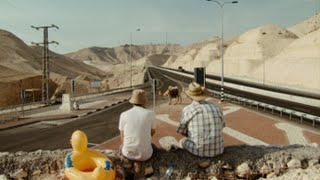 [PREMIERE SCREENING: Monday, Jan. 25, 6:00 pm -- Holiday Village Cinema IV, Park City] Fix ME... The hardest decisions during the making of this film were all connected to the recording of my personal therapy sessions. From the beginning I wanted those sessions to be honest and real. I wanted the doctor to do his job and to treat me during the sessions as if the camera does not exist. But on the other hand, as filmmaker I also wanted to be sure that I have enough interesting material coming out of the filming material of those sessions. I had to make an important decision: Who would take control over those sessions — the patient, “the filmmaker,” or the doctor? I made a decision to leave the filmmaker’s agenda out of the therapy room and to give absolute control to the doctor. I agreed with my psychologist that the cameraman would film from behind a one-way mirror window, and he will always be a foreigner who would not understand the Arabic language. Also I agreed with my doctor that I would not review the filmed material before the end of the last therapy session. I simply gave control to the doctor, and such a decision was so risky for the project, but honestly I was so glad when I started to look to the material after the last therapy session and found that reality always gives much more interesting moments than most well-written lines. That is why I love documentaries.
# posted by Jason Guerrasio @ 9:00 AM
Sunday, January 24, 2010
HIGH SCHOOL |
co-writer-director, John Stalberg Jr.
-767969.jpg) [PREMIERE SCREENING: Sunday, Jan. 24, 11:30 pm -- Library Center Theatre, Park City] Cutting three scenes that I loved was a particularly difficult decision. One was a wonderfully awkward scene with Michael Chiklis and Erica Phillips, another was a deranged scene with Adrien Brody and Mykelti Williamson in Psycho Ed’s grow room, and then there was a classic with Andrew Wilson, discussing his freakish Moroccan childhood. These were some of the best scenes in the movie. I was so pleased with them, but ultimately they didn’t push the story along. I was trying to balance audience bladder pressure with laughs by tightening the movie as much as possible. I did use the Brody scene in a teaser trailer — having an Academy Award-winning actor like Adrien Brody fully committed to the insanity of that scene was too good to not keep in some form. However eliminating these scenes from the movie vastly improved the overall pace of the film. Lean is good. People have to pee. Photo By: Neil Jacobs
# posted by Jason Guerrasio @ 8:00 PM
FROZEN |
writer-director, Adam Green
-763713.jpg) [PREMIERE SCREENING: Sunday, Jan. 24, 11:59 pm -- Egyptian Theatre, Park City] The most difficult choice I was faced with in making Frozen was the decision between shooting the film entirely practically or shooting it while incorporating such luxuries as a sound stage or green screen for certain scenes. Given the extremely challenging nature of the story and that it all takes place 50 feet in the air and in treacherous weather conditions, the pressure was on me to try and plan the shoot in as safely and as financially secure a way as possible. However I felt that my audience was way too smart and savvy to believe a survival film shot in the safety of a sound stage. I ultimately decided that if I gave the actors physical relief it would not be serving the story or their performances justice. So there we were, on the side of a mountain, overnight, in the dead of winter, shooting through blizzards of up to 36 inches of snow a night, hanging from a chair-lift cable 50 feet in the air, and literally risking our lives at times. Throughout production, my crew even received calls from their associates on other film productions around the country asking if it was true what we were attempting to do and claiming that we must be crazy. People around the country were talking about us! I was even called “Ahab” during preproduction because of my unbending will to do everything in Frozen as real as possible, no matter how hard it would be. I was going to conquer that mountain and you were either with me or against me. In the end we not only finished on time and on budget, but the Frozen experience is as undeniably “real” as it gets in every way. That crucial decision, however unpopular, literally made all of the difference. And while I still don’t know where or how I found the courage to attempt doing it, I would insist on doing it the same exact way if I had to do it again. Just please don’t make me do it again. I’m still thawing out. Photo By: Fred Hayes
# posted by Jason Guerrasio @ 8:00 PM
LUCKY |
director, Jeffrey Blitz
 PREMIERE SCREENING: Sunday, Jan. 24, 9:00 pm -- Temple Theatre, Park City] I think the hardest part of any film is figuring out when to let go of your original conception and let it become something else. If you release the ideal film that’s playing in your head too soon, you risk finding yourself lost in the wilderness. If you hang on too long, you might be ignoring the inevitably more interesting reality that the world has dropped in front of you. So that and figuring out new ways to shoot in bathrooms (there are four of them that made the cut!) were the most vexing parts of Lucky.
# posted by Jason Guerrasio @ 6:00 PM
ENEMIES OF THE PEOPLE |
co-director, Rob Lemkin
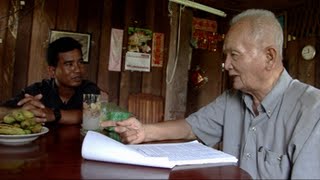 [PREMIERE SCREENING: Sunday, Jan. 24, 9:00 pm -- Holiday Village Cinema IV, Park City] There is a scene toward the end of Enemies of the People where two of our main characters, Suon and Khoun, admit to eating human body parts during the Killing Fields of the Khmer Rouge. I had been aware of this from when I first started filming with them in June 2007. My problem was this: This was vital information that an audience should know since our film is an up-close and personal account of a terrifyingly brutal episode in recent history. There could be no justification for airbrushing any elements of the horror. Yet the momentum for our film narrative depended on the audience’s connection with Suon and Khoun as men in the grip of forces way beyond their control. Once you knew that they consumed the gall bladders of some of their victims, any sympathy you might feel for these men from time to time through the film would be shattered forever. By May 2009 as we finished principal photography, Sambath, my co-director, and I had come to a very advanced state of knowledge about the Cambodian genocide and the role of our characters/sources within it. This very precise journalistic knowledge helped us to conceive a scene where Khoun and Suon would take us back at night with only resin torches to the place where the killing finally ended. In the course of that scene they describe the eating of body parts but they also describe how they felt liberated when all of a sudden the order came down from on high to stop the killing. Many of the preceding scenes had dwelt on Suon and Khoun’s (failed) spiritual quest for some kind of redemption. By putting this scene in the flames and darkness at the end we were able on the one hand to take the audience into the veritable “heart of darkness” in this story while allowing our two killers to rejoin the world of humanity. They are told to stop killing so they can be reunited with their families after the killing fields are over. The humanity at the heart of inhumanity is perhaps the key dramatic tension in our film, and I believe that in the end we got the balance right in this key scene.
# posted by Jason Guerrasio @ 6:00 PM
THE TEMPTATION OF ST. TONY |
writer-director, Veiko Õunpuu
-704508.jpg) [PREMIERE SCREENING: Sunday, Jan. 24, 8:30 pm -- Prospector Square Theatre, Park City] In the editing I cut out some scenes to make the film run smoother. The first version was more than three hours long. Sometimes I think I cut out too much but then again, when your film is canned, labeled and shipped off to another continent you might want to come to terms with its possible shortcomings so you don’t have to get acquainted with the symptoms of a mild psychosis later in life. Therefore I’ll just say that everything was all smooth and suave, no hard decisions to report. Photo By: Kaarel Nurk
# posted by Jason Guerrasio @ 6:00 PM
3 BACKYARDS |
writer-director, Eric Mendelsohn
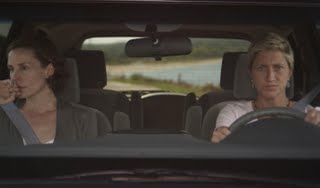 [PREMIERE SCREENING: Sunday, Jan. 24, 8:00 pm -- Racquet Club, Park City] For the last eight years I’ve taught directing at Columbia University’s Film Program — in my opinion, the best, most comprehensive film school anywhere. More than 25 of my students, past and present, were all working on 3 Backyards in a variety of positions ranging from production designer, co-producer, editor and script supervisor to key p.a. and craft services. One student in particular, Russ Harbaugh, decided he wanted to be part of the entire process, and so he signed on as my assistant. One day during preproduction I dragged him to the parking lot of a local grocery store so we could put fliers about my film (asking for local donations and support) on the windshields of parked cars. Standing a football field’s length away from him in the sweltering sun I held up my hand showing him first four fingers and then five fingers. Later on, he asked me what the four and the five meant, and I said, “I’m 45, Russ. I’m 45 and I’m standing in a suburban parking lot covering the windshields of cars like I’m advertising for the senior car wash.” And I couldn’t have been happier. The most complex decision I made during the making of 3 Backyards wasn’t a casting choice or a crew firing or anything that specific. It was about how I would embrace the experience. I have worked on films where my department’s total budget was twice what I had to make 3 Backyards and yet I have never had a more satisfying, challenging, creative experience in my life. Unlike my two other films, growing older had put me in a position where I could listen to and take advice from everyone around me. I tried to be open and receptive and acknowledge good ideas and to foster an atmosphere where people felt invited to do their creative best. We had so little money that every time some other piece of equipment or prop became unavailable to us I would say to the crew, “Well, the audience hasn’t read the script. They don’t know what we wanted so we’ll just get something else.” I am so indebted to the entire crew — people like John Shim (dolly grip), Mike Prall (second assistant camera) and Atilla Yucer (a.d.) — not because they helped me make my movie but because we collaborated to make our movie. I used to have a secret guilt that by making a low-budget movie I was “stealing” something from the crew — their work, their energy, their time. I have come to understand that that was a form of condescension, as if they didn’t have their own good reasons for working on the film. On 3 Backyards I worked in a manner I hope to work in again: respectful of the people working with me and aware of the fact that all filmmaking, even microbudget filmmaking, is a privilege when you get to do it.
# posted by Jason Guerrasio @ 6:00 PM
LOVERS OF HATE |
writer-director, Bryan Poyser
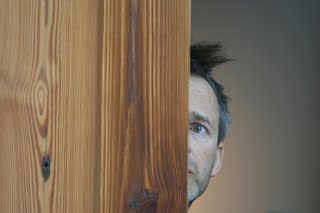 [PREMIERE SCREENING: Sunday, Jan. 24, 5:15 pm -- Racquet Club, Park City] For me, the hardest decision to make is of course the most important: the “telling the universe” moment, when you finally just decide on a shooting date, regardless of time, resources or common sense and start barreling toward it, telling your friends, your co-workers, yourself and thereby the universe that indeed, you are gonna make another movie. At first, it seems ridiculous and you usually have to push it back, but then serendipity takes over and the universe starts to drop things in your lap. You start the get the feeling that maybe, yes, the universe has agreed with you that, say, January 26, the day after Sundance 2009 ends, sounds like a fine start date for your movie that you will be shooting in a borrowed four-story, six-bedroom mansion in Deer Valley that you spent one night in and wrote an entire script based around (without knowing if you’d actually ever get permission to shoot there). The universe eggs you on. Why not fly in your actors the day the last stragglers from the festival are flying out and have your Austin-based crew drive up to Park City through snowstorms and subzero temperatures? I’m sure your crappy old Ford Escort, which will function as your picture car, will have no problem making the 1,400-mile journey loaded down with film gear! Even though you only have 11 days to blaze through 65-plus script pages, I’m sure you’ll make it! Wow, you really did make it! Wait, it appears that you don’t have a location for the final scene of the film, the emotional climax that will probably make or break the whole damn thing. Aren’t you shooting that, like tomorrow? Omigod, your production coordinator found the perfect place with a few hours to spare! Cool! Wait, wait, now you’re gonna have your crew drive back to Austin through more snowstorms and subzero temperatures so you can shoot out the remaining 40 pages of the script in only eight days? Don’t you all have day jobs? Ha ha ha! Remind me again how much money you have to make this thing? AH HA HA HAAA!!! Eventually one gets the feeling the only reason the universe lets you get away with making your little movie is because it finds this all enormously entertaining.
# posted by Jason Guerrasio @ 3:00 PM
THE FREEBIE |
writer-director, Katie Aselton
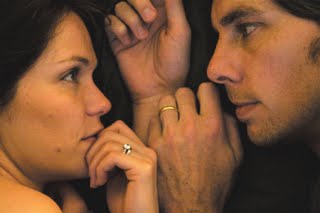 [PREMIERE SCREENING: Sunday, Jan. 24, 9:00 pm -- Yarrow Hotel Theatre, Park City] I recast our lead guy three days into shooting. It was terrifying, but it was something I had to do. He wasn’t having fun, we weren’t having fun, and I’m sorry, but when you’re making a film for no money, just for the love of the project, you better be having fun doing it! And in the end, we did. Those last 11 days were incredible!
# posted by Jason Guerrasio @ 3:00 PM
GASLAND |
director, Josh Fox
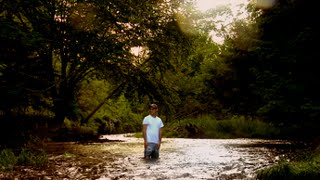 [PREMIERE SCREENING: Sunday, Jan. 24, 5:30 pm -- Temple Theatre, Park City] My film, Gasland, is about the largest domestic natural gas drilling boom in American history, now occupying 34 states. I was approached to lease my family’s land in the Delaware River Basin right on the border of New York and Pennsylvania. It’s not a big place by any means, but the drilling boom is everywhere, and we were approached. The hardest decision I had to make was to include not only my personal story in the film but to narrate it and appear in it. The film is part vérité travelogue, part exposé, part mystery, part bluegrass-banjo meltdown, part showdown. And the film includes encounters with EPA whistleblowers, congressmen, scientists and some of the most incredibly inspiring and heartrending stories of ordinary Americans who have had their lives and homes decimated by drilling they were led to believe was safe, prompting them to lease their land. Or, these Americans had no control over the land because they did not own their own mineral rights. So, including myself and my story on an area which is under severe threat from the proposed drilling in a pristine watershed area, which supplies 14 million people with water, was a tough choice because it was so personal. As a result I have become a kind of expert and very public spokesperson on this issue, and that has thrust me into the national spotlight. Many of my friends told me, “Josh, you have to be in this movie. It’s your story too.” And that decision I think has proved very important. It is what I think separates this film from most documentaries. It’s very personal and the journey is intensely emotional. As I learn about the drilling and the amazing scope of the problems that exist, the audience is right there with me. As I learn of the neutering of the federal agencies, the fact that the EPA was completely taken off the job and the industry was let loose to inject toxic chemicals under the ground directly into or near drinking-water sources, the audience learns that too. As it dawns on me that this is a huge national and international issue that I have somehow stumbled upon as just a guy with a camera, I think the audience starts to feel how much both they and I have been kept in the dark about this. The question becomes, “Why hasn’t the media or anyone else been talking about this?” What results is a kind of surreal upside-down world, where people can light their water on fire right out of their tap because of natural gas contaminating their water supply, where people and animals get sick and land is destroyed. And despite all of the total craziness of what is happening, the human story comes through. The people in the film have an amazing sense of humor and sense of resilience that is surprisingly optimistic and inspiring. And this kind of honesty and shock and humor all at the same time becomes a thrilling portrait of American character. I don’t think if I made a conventional piece about the drilling it would have anywhere near the humor, the emotional impact or the poetry of what happens when you are following a first-person narration. So that was a tough decision because in many ways it was uncomfortable for me to be a director and in front of the camera. But it makes the movie. And in this time of Obama’s election by an incredible grassroots movement and a huge amount of personal volunteerism and dedication, it is exactly this kind of personal involvement that I think is required if we are to change our circumstances with regards to fossil fuels that are inherently contaminating and destructive. If we are going to be serious about alternative energy, which we now have the technology to use to replace our fossil fuel energy consumption, it is going to take a huge personal effort to make that change. I am very personally optimistic about it.
# posted by Jason Guerrasio @ 2:00 PM
THE TAQWACORES |
director, Eyad Zahra
-741605.jpg) [PREMIERE SCREENING: Sunday, Jan. 24, 5:30 pm -- Prospector Square Theatre, Park City] The thought of making The Taqwacores into a motion picture happened right after I finished the book. It took weeks for me to voice the thought to others, and weeks more to actually act upon it. Was I ready to take on such a subject? Was I the right guy? Were my intentions right? Would people get the point? Would it be more misunderstood then understood? These were the questions swirling in my head. The idea of physically making the film at such a low budget wasn’t nearly as big a worry. The bigger concern was making a film about the ideas presented in The Taqwacores. Almost everybody involved with this film had this same kind of internal discussion at some point in time. After about a few months of thinking about it, I finally reached out and contacted The Taqwacores author Michael Muhammad Knight. Months of pondering led up to that call. After that call was made, there would be no looking back for myself. The decision to make this film was the hardest one to make. The weight of that decision is what maintained the quality of this production from start to finish. Photo By: JP Perry
# posted by Jason Guerrasio @ 2:00 PM
8: THE MORMON PROPOSITION |
director, Reed Cowan
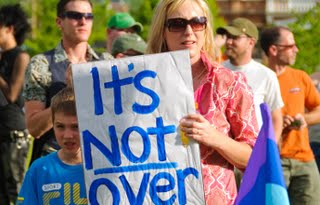 [PREMIERE SCREENING: Sunday, Jan. 24, 2:15 pm -- Racquet Club, Park City] The hardest decision for me was getting well with the fact that the entire film goes up against everything I was ever taught. To not question the leader of the church of my birth. To not point a critical view in the direction of the religion I was always taught to be the ONLY true religion on the planet and the ONLY way to attain the highest level of Heaven. We are the product of our cultures, and shedding the fear that was ingrained in my psyche was not only tremendously difficult, but in the end, powerfully liberating. I began to see that it is okay to testify against the abuser, so to speak. Really, what we’re talking about is a commitment to truth and the bold telling of it. Once I made that commitment, the film came to life. Before it was a collection of echoes, if you will. Once I committed to telling the truth — all the truth — the film had one, singular voice. And it’s better because of it.
# posted by Jason Guerrasio @ 12:00 PM
WASTE LAND |
director, Lucy Walker
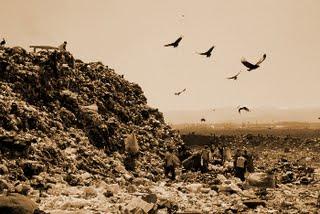 [PREMIERE SCREENING: Sunday, Jan. 24, 3:00 pm -- Holiday Village Cinema IV, Park City] In Star Trek there’s the “prime directive,” Starfleet’s code of noninterference. What do filmmakers abide by? Should documentaries interfere with their subjects’ lives? But how could they not? I don’t believe in objectivity. I observe the observer’s paradox every moment I’m filming. Your presence is changing everything; there’s no mistaking it. And when you’re climbing Everest with eight blind people (as I did for my last film Blindsight) there is no acceptable margin for mistakes. So now when the artist Vik Muniz and I were conceiving Waste Land, the first decision is whether to make something happen so we can film the results — especially when that something is dangerous. I called it the Everest of art projects — making football-pitch-sized pieces out of garbage in the world’s largest landfill, then attempting to sell photographic prints back to the rich people who threw out the garbage in the first place to raise money for the poorest people in Brazil. When I first met the catadores, or garbage pickers, they were shockingly cool. One of them finds Machiavelli’s The Prince, teaches himself to read, and ingeniously compares the politics of 16th-century Florence to today’s favela wars in Rio. They never went to school, get their books from the garbage, yet have a keener love of books than most graduates and a better grip on life than most people I know. They told me they chose to work with garbage because, unlike prostitution or drug dealing (their other career options), the only persons they are hurting are themselves. Is the same true of my work? Because once we began filming some of the catadores no longer wanted to go back to the garbage, and as the drama unfolds, is that a good thing or a bad thing, and whose responsibility is that? Something I love about Waste Land is that the questions poke through the fabric of the movie as things get messy. As with Blindsight, when the decision to climb Everest is dramatically questioned on-camera as things head south, in Waste Land Vik and his wife start to fight on camera about whether we are hurting the people we are trying to help. Because you always have a responsibility as a filmmaker, just as you do as a human being. The question is what that responsibility is.
# posted by Jason Guerrasio @ 9:00 AM
THE DRY LAND |
writer-director, Ryan Piers Williams
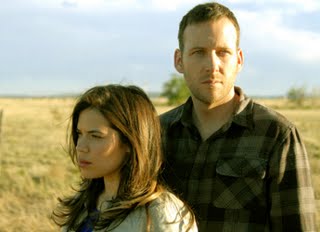 [PREMIERE SCREENING: Sunday, Jan. 24, 12:15 pm -- Eccles Theatre, Park City] I was born and raised in Texas and have a strong loyalty to the state. One thing I’ve known since I was a child is that while they may appear to be similar, New Mexico and Texas might as well be Venus and Mars. The Dry Land’s characters, setting and nuances are all rooted in Texas. However the lack of substantial tax incentives in Texas made it very difficult to argue for a Texas shoot. With this in mind my financiers pushed for me to consider shooting in New Mexico. Offering a 25 percent film rebate it was very difficult not to seriously consider the idea of shooting in New Mexico. After looking over the budget, I quickly realized that a Texas shoot would come at a great cost. With our budget I could basically shoot in Texas on a digital format with a limited crew and a local cast or I could shoot in New Mexico on Super 16mm with a sizable crew and a stellar cast. Ultimately I knew that if I wanted to achieve the film I envisioned I would have to shoot in New Mexico. My great challenge would be to create west Texas in New Mexico. After several location scouts in New Mexico I knew it was going to be incredibly difficult to sell one world for the other, but it was possible. My location manager, Holly Roach, and I searched all of the areas around Albuquerque high and dry. After weeks of scouting we were able to carve out several key locations to cover 90 percent of our interior work and roughly 75 percent of our exterior work. With a great deal of ingenuity by my producer and line producer (Heather Rae and Mark G. Mathis) were able to carve out a splinter unit shoot in Texas that would allow me to fill the film with the nuances needed to sell the film’s world for Texas. At the end of the day I feel like the decision to shoot in New Mexico was the best decision for the film. Financially the decision allowed me to afford the production value I had hoped for, and creatively the decision forced me to constantly think outside the box. In the process I also discovered that the New Mexico crews are some of the hardest working and most passionate group of individuals I’ve ever met. Every step of the way our crew pushed the envelope of our limitations in order to achieve the look we were going for. At this point I would shoot another film in New Mexico in a heartbeat.
# posted by Jason Guerrasio @ 9:00 AM
12th & DELAWARE |
directors, Rachel Grady & Heidi Ewing
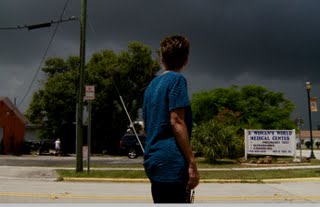 [PREMIERE SCREENING: Sunday, Jan. 24, 12:00 pm -- Temple Theatre, Park City] 12th & Delaware takes place over one year on a single street corner in coastal Florida. On one side of the street stands an abortion clinic. On the other a pro-life operation whose single objective is to persuade women who are considering abortion to continue with the pregnancy. We discovered these pro-life organizations (known as crisis pregnancy centers, or CPCs) while filming Jesus Camp, and to our knowledge no filmmaker had unveiled the goings-on of any of the 4,000 such places in the United States. CPCs represent the primary and most powerful strategy in today’s pro-life movement, and our intention was to shine a light on what happens inside. We gained access to Pregnancy Care Center in Fort Pierce, Fla., and began shooting. After many months it became clear to us that the portrait of abortion and its consequences painted daily by the pro-life counselors (as well as some questionable medical information they were dispersing) begged to be countered by someone on the other side of the issue. This presented a problem. Stylistically we didn’t want to simply bring in outside experts or talking heads to push back on the methods of this crisis pregnancy center. In addition, we were telling a microcosm of a much larger issue, so we needed the specific foe of this particular crisis pregnancy center. We had to cross the street and film inside the abortion clinic. Changing our approach late in the game forever altered 12th & Delaware. Instead of being purely a “day in the life” inside the unseen world of the pro-life movement, the film became a chronicle of the raging battle occurring between two neighbors who are locked in a bitter personal and ideological struggle. It also became evident to us that this seemingly banal intersection could serve as a metaphor for the intractable divide over abortion in this country. Besides reimagining our film, we had to confront the very difficult task of cutting through the personal gripes of the protagonists and portraying as fairly as possible the daily realities of both sides of the street. This is the most difficult subject matter that we have delved into to date. We hope we got it right, and look forward to sharing it with audiences when we debut the film at Sundance 2010.
# posted by Jason Guerrasio @ 9:00 AM
WINNING TIME: REGGIE MILLER VS. THE NEW YORK KNICKS |
director, Dan Klores
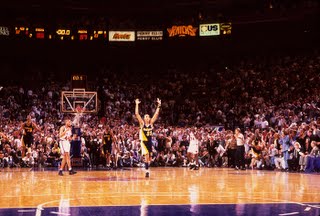 [PREMIERE SCREENING: Sunday, Jan. 24, 11:30 am -- Prospector Square Theatre, Park City] My film takes place in the basketball arena of the early-to-mid 1990s. I listened to hundreds of hip-hop songs and fell in love with a few. But I always felt Reggie Miller was a performance artist, and Madison Square Garden/New York City was his Carnegie Hall. Therefore I decided that operatic music could carry the drama in a different and hopefully funny way. So I chose Puccini over Puff Daddy.
# posted by Jason Guerrasio @ 9:00 AM
Saturday, January 23, 2010
BHUTTO |
director, Jessica Hernandez and Johnny O’Hara
 [PREMIERE SCREENING: Saturday, Jan. 23, 9:00 pm -- Temple Theatre, Park City] The hardest decision was whether to bring in a narrator or try and let Benazir tell the story through her own words. The easy way out would have been a narrator, but since Benazir was such a public figure from such an early age we decided to piece her life together in her own words, keeping her alive not only by virtue of the documentary but in the documentary itself. We had a stroke of good fortune when producer Mark Siegel remembered the existence of interview tapes from Linda Bird Francke, a writer who had collaborated with Benazir. We were able to track down Linda and the long-forgotten cassette recordings of Benazir’s own voice. She generously allowed us access to the tapes, which to this day, have never been heard publicly and represented hours of Benazir’s most intimate thoughts, beliefs and fears. Why was it so difficult? The question became could we piece together a through-line narrative in Benazir’s own words. The tapes were hours upon hours of interview and after listening to them, we found they’d aged to a point of deterioration; some of the tapes incapable of being repaired even by sound experts. Funder/Producer Duane Baughman approved the decision to make a hefty investment into getting the tapes professionally scrubbed so we could make our creative decision work. In addition to the tapes, Benazir did hundreds of other interviews and speeches in different countries and different languages. Finding the right footage was akin to an archeological dig. How did it affect our film? It made the film much more intimate and authentic to hear the words come from Benazir herself — Benazir’s own story in Benazir’s own voice from beyond the grave.
# posted by Jason Guerrasio @ 6:00 PM
BURIED |
director, Rodrigo Cortés
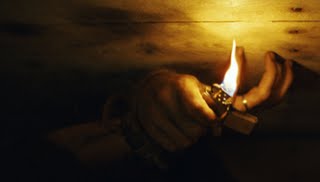 [PREMIERE SCREENING: Saturday, Jan. 23, 11:30 pm -- Library Center Theatre, Park City] Ninety minutes inside a coffin. Ninety minutes. Inside a coffin. Underground. In an old wooden coffin. Darkness. No room. The most difficult decision? Believe it or not there was no choice for me, I didn’t see any blue pill, I simply NEEDED to do this. The most difficult decision would have probably been saying no. And I didn’t. Maybe I should have.
# posted by Jason Guerrasio @ 6:00 PM
BASS ACKWARDS |
writer-director, Linas Phillips
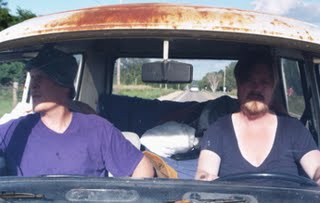 [PREMIERE SCREENING: Saturday, Jan. 23, 8:30 pm -- Prospector Square Theatre, Park City] Decisions, decisions. I was practically penniless again and semihomeless after finishing my last film, Great Speeches from a Dying World (ironically enough a film about homeless people) when I decided to start on Bass Ackwards. Not the best time to make a movie, one could argue. So…why? Well, I like to make movies and I have things to say, and because my friend, Todd Rohal, sent me a link to a Craigslist ad for a “strange van.” Of course, I bought the van and started writing a story. Todd and I toyed with the idea of us being the main characters in this story until we decided that our humor and chemistry wouldn’t be the right fit for where I was heading tonally and storywise. So I had to decide if I should make a film although I didn’t have another male lead. After deciding that we owed it to the footage we already shot, I called my friend Jim to come on board at the last minute. We did amazingly well for only a 10-day shoot on the road. We obviously didn’t have enough time to get everything I felt the story needed. Another difficult decision I faced was waiting until I was able to shoot for a few more weeks, which didn’t end up happening until almost 13 months after I originally started filming. It was very hard to keep my love for the story alive all that time and to keep my faith that it would ever happen while waiting for other people’s (who we weren’t paying) schedules to open up. It was also difficult to turn down other jobs just to be free and worrying whether my hair would even match since we had no continuity or hair-and-makeup person. Anyway, enough complaining, every film seems to take a certain emotional toll on me, and each one usually isn’t clear when I first decide to begin. But that’s how life works, too. And it’s often that personal struggle that is inextricably tied to the emotional struggle in the story of the film. Although things sometimes can get miserable, I wouldn’t have it any other way.
# posted by Jason Guerrasio @ 6:00 PM
SWEET, SAMPLED AND LEFTOVA |
Kalup Linzy
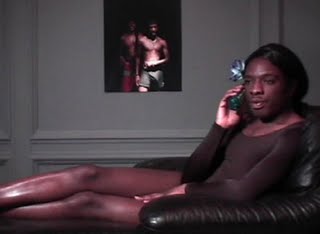 New Frontier Performances and Installations [PREMIERE SCREENING: Saturday, Jan. 23, 6:30 pm -- New Frontier on Main, Park City] One of the most difficult things that has come up in my projects over and over is the casting. For different reasons, many of my projects have never included the original intended cast I had in mind. I have learned to be open to this, but at the same time I have to wonder if I compromised my original vision or maybe the universe has a plan of its own. Either way I’ve learned from the experiences and hope that I can continue to be less conflicted and open to more than one possibility.
# posted by Jason Guerrasio @ 3:00 PM
NIGHT CATCHES US |
writer-director, Tanya Hamilton
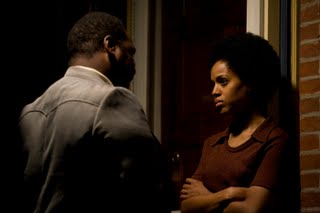 [PREMIERE SCREENING: Saturday, Jan. 23, 5:15 pm -- Racquet Club, Park City] The hardest decision I made on this film was mustering the courage to deconstruct my film completely in postproduction. I don’t know if other directors had similar experiences with their films, but when I first pieced Night Catches Us together, while I was pleased with it, it no longer felt as creative as I’d hoped. Something was missing — though I couldn’t determine what. At first I was too overwhelmed and exhausted to confront the problem, let alone address the ways I needed to fix it. But eventually, with the support of a trusted group of my colleagues, I was able to start deconstructing and reconstructing the film from the start. During that process, I finally realized the missing ingredient was archival footage. Although presenting archival footage in a feature presents many challenges, especially to the film’s authenticity and accuracy, I felt it was an essential ingredient to the world I’d constructed. Building the archival world in Night Catches Us wasn’t easy; it took many weeks and many iterations before it could be woven into the narrative of the film. But I think it was an important step for turning this film around and making this story as relevant today as I’d hoped when I wrote the script.
# posted by Jason Guerrasio @ 3:00 PM
NEW LOW |
director, Adam Bowers
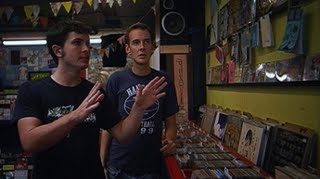 [PREMIERE SCREENING: Saturday, Jan. 23, 6:00 pm -- Yarrow Hotel Theatre, Park City] There were a couple of reshoots during production, most of which were short and painless. But after we shot a pretty complicated scene at a time-sensitive location, I watched the footage on the camera in my car while the cast and crew went and got dinner, and I knew that the scene was unusable. So I had to go meet up with everyone, who were so relieved to be done with such a tricky scene, and tell them that we had to do it all over. The problem was we shot at dusk in front of a restaurant which we couldn’t go back to. Luckily the first shoot was such a mess that the end of the scene, taking place in front of the restaurant, ended up being filmed after it got dark. So on the last night with one of our lead actresses, after we got done shooting her final scenes at around 3 a.m., we went back to that location and reshot it. We were so groggy by then that we broke the 180-line during the first half of the scene, so I had to end up using the first version of that part anyway, and shuffle some things around to make the shift from sunset to nighttime work. So, even with the reshoot, we were just barely able to make it work in post. A lot of other no-budget films probably would have just dealt with the footage we had from the first shoot, so I was at least happy that we had high-enough standards for our film to know that the footage didn’t meet them.
# posted by Jason Guerrasio @ 3:00 PM
WOMEN WITHOUT MEN |
writer-director, Shirin Neshat
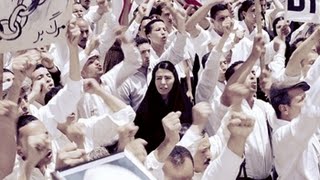 [PREMIERE SCREENING: Saturday, Jan. 23, 6:30 pm -- Screening Room, Sundance Resort] Women Without Men was my first feature-length film, so numerous challenges had to be faced throughout the process of its making. First of all I’m a visual artist — a photographer and a video artist — so I had never written a script or had worked with a producer, professional actors, or a large crew before. Also the film was based on a well-known novel by Iranian author Shahrnush Parsipur. This novel was written in a style of magic realism, an extremely difficult piece of literature to readapt into a film. The narrative follows four main characters simultaneously as they each struggle through personal crisis and seek freedom and independence. Meanwhile, unlike the novel, I expanded the political dimension of the film and showed how the country of Iran too struggled at the time for an idea of freedom and democracy against foreign and local dictators (during the CIA organized Coup of Summer 1953). So the difficulty remained in how to find the right balance between a political story and a personal narrative of four women; how to raise deeply poetic, philosophical and timeless issues while exploring important political and historical issues that belonged to a specific country; how to make art through every single frame and conceptual approach while respecting the cinematic language and its conventional way of storytelling. At last, after taking several years of careful study and preparation in script writing, production and postproduction, I believe I delivered a film that although not at all flawless suggests the best balance I could find and offer to the world in between the wonderful properties of the novel and my own artistic sensibilities.
# posted by Jason Guerrasio @ 3:00 PM
CLIMATE REFUGEES |
director, Michael Nash
 [PREMIERE SCREENING: Saturday, Jan. 23, 8:30 pm -- Library Center Theatre, Park City] The single biggest decision I was faced with during the making of Climate Refugees literally happened on the first day. Was it possible to make a documentary film about climate change that would be politically bipartisan? I wanted to create a film that would play to both sides of the aisle. To me, I saw climate change as a metaphor in which a woman is swimming in the ocean. She is attacked by a shark. She is barely able to swim to shore. Two men see the attack and run down to help her. Just as one of them leans in to help the bleeding woman, the two men get in a debate about what type of shark attacked the woman. One thinks it’s a great white, the other thinks it was a tiger shark. Meanwhile, as the debate gets forceful, the bleeding woman dies. To me, the film was always about the bleeding woman. The politicization of climate change in America is really what made this so difficult. There had never been a film on the subject matter able to cross into both parties — or one that actually tried. We had a private screening of the film in the Capitol Building in D.C. for policymakers. For the most part, the audience, regardless of their political views, endorsed the film and its message. Based on my decision the very first day, I believe that the film will play to a wider audience and help mend the polarity of the subject matter. In fact, when we screened in Copenhagen at the COP15 as an official United Nations event, this very non-partisan approach to filmmaking resonated with the audience made up from scientists and policymakers from all over the world. Photo By: Michael Nash
# posted by Jason Guerrasio @ 3:00 PM
THE TILLMAN STORY |
director, Amir Bar-Lev
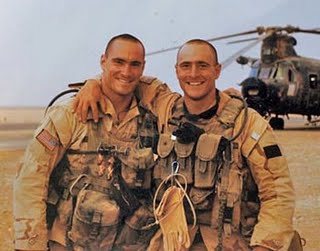 [PREMIERE SCREENING: Saturday, Jan. 23, 3:00 pm – Temple Theatre, Park City] Here’s a challenge I faced making The Tillman Story: As a documentary filmmaker making a movie about Pat Tillman, I’m expected, of course, to get to bottom of who he really was and to leave no stone unturned in presenting his biography and character to my audience. Pat Tillman is synonymous with sacrifice and unflinching patriotic duty because it’s generally accepted that he was so moved by the events of 9/11 that he dropped everything, quit his football career, and enlisted in the Army Rangers. However the more I learned about Pat, the less accurate this depiction seemed. In fact, Pat Tillman never discussed his reasons for enlisting, and he specifically asked that the public and press respect his privacy in this matter. So what do you do when the subject of your film, a dead man, has requested that your inquiries into his character and choices only go so far? Are we filmmakers private investigators, committed to unearthing every truth no matter the consequences? Or do we let other considerations inform our storytelling? As I probed deeper into Pat’s story, the two impulses found themselves in opposition: On one hand, I felt that the record needed to be corrected. On the other hand, the more I learned about Pat, the more I admired his silence. The mainstream media, I found, had initially given lip service to this same admiration, begrudgingly chalking up his refusal to give an interview to a type of Greatest Generation-style modesty, even though it meant that they wouldn’t be getting their story. But as soon as he died, it was as if we were going to turn him into a Great American War Hero whether he wanted that or not. After all, he was no longer around to object. Pat Tillman’s tragic last words were repeatedly, “I’m Pat fucking Tillman.” He was trying to signal to his fellow soldiers, who were unloading their weapons at him for over a minute from only 40 meters away. He couldn’t have known how prescient these words were because almost immediately after his death a process began of killing him again of killing who he actually was through lies and caricature. In making this film, I often felt that these last words were a challenge to me and anyone else who might tell Pat’s story in the future, an exhortation not to participate in further mythologizing and not to force easy answers out of Pat’s life or death. As we prepare to premiere The Tillman Story at Sundance, I’m hopeful we’ve gotten the story pretty fucking right.
# posted by Jason Guerrasio @ 12:00 PM
WELCOME TO THE RILEYS |
director, Jake Scott
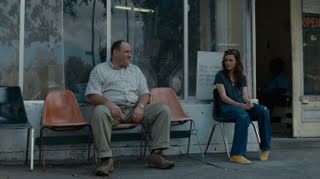 [PREMIERE SCREENING: Saturday, Jan. 23, 2:15 pm -- Racquet Club, Park City] Casting the film was probably the hardest series of decisions I had to make. I found that there was tremendous pressure to cast well known and very good actors who could potentially “mean more” in terms of getting the film made. You find yourself considering actors who are simply not right for the role and yet willing to risk the consequences. It was incredibly stressful but at the same time led me to consider the film in certain terms. If this was to be “my film” as director then I would have to stand my ground on this crucial point. I imagine that this is nothing new, but to me it became a liberating and enlightening decision. The actors I ended up with were exactly what I had hoped for.
# posted by Jason Guerrasio @ 12:00 PM
LIFECYCLES |
Matthew Moore
 [New Frontier Performances and Installations] As a fourth-generation farmer, there seems to be an endless supply of crossroads while growing produce where, unlike in an editing program, you cannot undo the last 50 decisions you have made. What day to plant, how many seeds to place in a foot, how long to water, is that a weed, should I pull it? So here is a brilliant idea — how about I film that process? Hopefully the seed I placed in focus under the lens is the one that will emerge unscathed. That is how my project “lifecycles” began. Unfortunately all manner of animals and insects heard about my idea and were waiting in the weeds, as it were, to snack on my precious documentary subjects. I have found that releasing the vision of how the film should look in my head has been the most difficult endeavor of this project. I initially envisioned a consistent, flawless specimen growing before the viewer’s eyes. This is the point where the artist in me collided with the farmer, and thankfully, the farmer prevailed on this one. As plants don’t grow in a vacuum, who am I to try and make a whitewashed version of the natural world at work. In retrospect, that is actually pretty boring to watch. What makes farming exciting is that no matter how many years you do it, and how many times you grow the same crop, each day brings a complete new set of considerations that you have never experienced. I do feel that this will benefit the project in the long run as the goal is to have farmers documenting their crops so we can learn, enjoy and better understand how our food is created. The process is truly a gift and a royal pain in the ass at the same time. I suppose the same can be said about the creative journey of filmmaking as well.
# posted by Jason Guerrasio @ 10:00 AM
WINTER'S BONE |
co-writer-director, Debra Granik
-766610.jpg) [PREMIERE SCREENING: Saturday, Jan. 23, 12:15 pm -- Eccles Theatre, Park City] In Daniel Woodrell’s novel, the protagonist, Ree Dolly, has two younger brothers. We decided to cast these roles in Missouri and held auditions during preproduction. We were excited to find Isaiah Stone for the part of the older boy, Sonny, but we struggled to cast the younger boy. We auditioned a lot of boys, and then paired different boys with each other. We thought we were getting close, but something was holding me back. The boys we were moving toward were not from the rural areas in which we were filming. I could sense that we were going to end up with a boy who would work hard but who would never feel like part of the scrabble that we were shooting on. Meanwhile during rehearsals and auditions that we held on location, I would turn to the 6-year-old daughter of the family who owned the property, Ashlee, and ask her if she could show me or the boys how to do certain things. She was not shy off-camera, but she did hesitate to do things over and over. I was not sure she could sustain the arduous process of filming. But every time we reviewed the rehearsal tapes, I was drawn in by her presence with Jen Lawrence playing Ree, and the way she could be in the house and on the land with a natural ease; she was literally at home on the set. We were down to a few days before production. The pressure to have the casting locked up was raging. So changing that role to a girl was actually an afterthought, born from desperation. Do I dare change the main character’s family composition 96 hours before we roll, after having lived with the story for three years? But I knew I was hooked on Ashlee for the role. We issued a pink draft changing “he” to “she.” That change added some interesting resonances to the story, and I feel that Ashlee turned in a strong performance that is really the heart of the film. Photo By: Sebastian Mlynarski
# posted by Jason Guerrasio @ 9:00 AM
LAST TRAIN HOME |
director, Lixin Fan
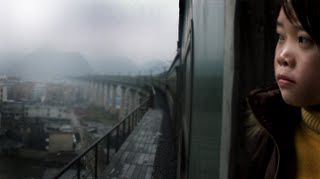 [PREMIERE SCREENING: Saturday, Jan. 23, 12:00 pm -- Screening Room, Sundance Resort] The most difficult decision I had in the making of Last Train Home is one that spans from shooting ground to editing room. It was at the painful moment when the crew and I witnessed the father become frustrated and hit his daughter right after they arrived at their village home before New Year’s Eve. To film or not to film? The ultimate question in documentary filmmaking was being put in front of me. In a filmmaking sense, this was a rarely intense moment, which revealed incredible personalities and conflicts of the protagonists. It also made an unusual twist to the story line, and potentially the climax of the entire film. But on a moral and ethical level, the filmmaker is, as always, being challenged if he should keep a documentary filmmaker’s observational objectivity or if he should be a compassionate human being. It’s a tough choice for any filmmaker. When the father hit the daughter, I was in another room, and my cameraman and sound man were filming the outbreak of the confrontation. I heard the shouting and immediately came to the room. The daughter had already fallen on the ground. For a split moment, I had struggled to comprehend the situation and tried hard to make the “right” decision. I surely didn’t want to lose the scene, but it’s also difficult for me to see the family breakdown. We had spent so much time together, the crew and the Zhangs were like one family. I had been put on a hotspot at that moment when seconds felt like years. When again the daughter agitated the father and he tried to smash her the second time, my intuition took over mental debate, and I went into the frame to separate the two. In the editing room, I had a very hard time and felt a serious moral challenge again over my own conscience. The Chinese culture always puts family in key positions in any interpersonal relationships. I felt I betrayed the Zhangs and myself as a human being by not stopping the camera upon the second I was in the room. Our editor, Mary Stephen, had a long conversion with me. She told me that I shot the footage so I should be responsible for it. It is beyond this controversial scene itself: it’s about how a filmmaker should keep his integrity by being truthful to the footage he shot and to his audience. Not hiding is the key. Not hiding your footage, not hiding as a person and not hiding as a filmmaker because your audience deserves your total honesty. This is a valuable lesson I learned in the making of Last Train Home. I can safely say it also had a great impact on my view toward life as well.
# posted by Jason Guerrasio @ 9:00 AM
NUUMMIOQ |
director, Otto Rosing & Torben Bech
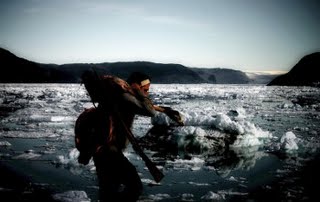 [PREMIERE SCREENING: Saturday, Jan. 23, 11:30 am -- Egyptian Theatre, Park City] There were so many factors that worked against us: the constant weather instability, sensitive technical equipment and working in a country without technical backup. This was compounded with the pressure of a constant lack of funds. At times it was like we were walking on unstable sheets of sea ice, and if we didn’t continue to go forward, we would fall through the ice sheets and drown. The next challenge was turning the material that we shot into a movie in the editing room. Listening to material and letting it live, giving space to what worked instead of what didn’t and finally finding the story that wanted to be told. Through all of this we pulled together as a team: Greenlanders, Danes, the crew, the cast, the community and the nation.
# posted by Jason Guerrasio @ 9:00 AM
MOTHER AND CHILD |
writer-director, Rodrigo Garcia
-763008.jpg) [PREMIERE SCREENING: Saturday, Jan. 23, 3:00 pm -- Screening Room, Sundance Resort] The hardest decision for me is offering the role to an actor. Even if it’s an actor that I admire, or have worked with before or dream of working with, or even if I’ve written the role with them in mind, the moment is traumatic. It’s the leap from the imagination to the concrete, from fantasy to reality. Plus I know that if you cast the wrong actor (and any great actor can potentially be wrong for a specific role), it’s a mistake that you never recuperate from. Once an actor comes on, the fear subsides. Now they are the character and the character is them and I not only accept it, I am delighted by it. It fuels me. Photo By: Ralph Nelson
# posted by Jason Guerrasio @ 9:00 AM
Friday, January 22, 2010
THE OATH |
director, Laura Poitras
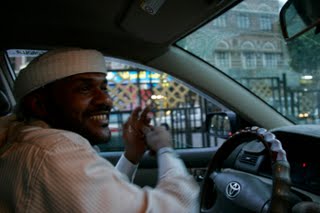 [PREMIERE SCREENING: Friday, Jan. 22, 9:30 pm -- Temple Theatre, Park City] There is a scene in The Oath when I ask Abu Jandal if he would have participated in the 9/11 attacks if Osama bin Laden had asked him to participate. He answered my question (I don’t want to reveal his response), and the next day he asked me to delete it. I decided to include both his answer and his request to delete it in the film. In the process of editing the film, we held work-in-progress screenings and some people questioned the ethics of including his answer in the film. I decided to include Abu Jandal’s answer because it provides unique insight into Al Qaeda and how it operates. Abu Jandal is very well-trained in communications and is extremely media savvy. In his answer, he was very clear to separate his personal views from those of Al Qaeda and that he was not speaking on behalf of the organization. The scene also reveals his contradictions, which is a key element to understanding him. But it was not an easy decision. Although Abu Jandal’s story has been made public in print (Larry Wright’s The Looming Tower, Abu Jandal’s Al Quds interview, etc.), I understand that the documentary will draw new attention to him. In the end I decided to include his answer because it was on the record and because it provides valuable insight into Al Qaeda and Abu Jandal.
# posted by Jason Guerrasio @ 3:00 PM
ARMLESS |
director, Habid Azar
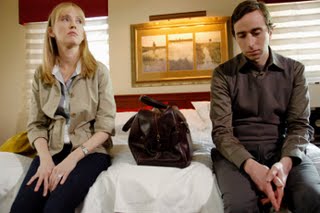 [PREMIERE SCREENING: Friday, Jan. 22, 9:00 pm -- Yarrow Hotel Theatre, Park City] Finding locations with no budget was by far the hardest thing we had to do. There are two specific examples that I think are interesting: We had a one-page scene that took place in an operating room. Finding an actual operating room was impossible so the decision became do we change the scene or do we fake the location? In the end our brilliant production designers Ryan Kravetz and Eunice Bae dressed a corner of a room with a few boxes of medical-looking equipment, hung a curtain in the foreground, and set up a desk with a blue cloth on it as the operating table. The brilliant stroke was our d.p. Orson Robbins-Pianka’s decision to hang a strong top light and keep the room mostly in shadow. The dark and moody final product had absolutely nothing to do with a real-life operating room, but it was absolutely beautiful and perfect for the tone of the scene. Then there were the six pages that took place in a hotel lobby. We had the opportunity to use the grand lobby of a New York City hotel for $4,000, but we decided that we couldn’t afford that and put our production designers to work again. We took the corner of a hotel room, set up a desk on apple boxes, put a luggage cart in the foreground, hung a red curtain and rented a chandelier to hang in the background. Unfortunately in this instance the final product looked terrible. It was claustrophobic and had no sense of place. And we couldn’t hang the chandelier back far enough for it to read as anything other than a halo of lights behind our main actor. Watching the scene makes me cringe and wish I had spent the money on the lobby, even though it seemed unreasonable at the time. Photo By: Sarah Sloboda
# posted by Jason Guerrasio @ 3:00 PM
7 DAYS |
director, Daniel Grou
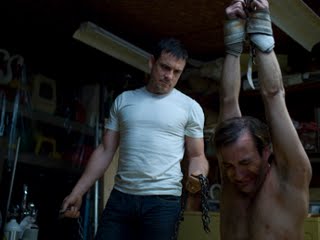 [PREMIERE SCREENING: Friday, Jan. 22, 11:30 pm -- Prospector Square Theatre, Park City] 7 Days (director, Daniel Grou) To show or not the murdered girl on screen. One of the reasons it was difficult was because in order to show her, I had to figure out how she would look. In other words, what the murderer/rapist had done to her. It troubled and pained me to go there. Also, I was concerned with the impact the image would have on the viewer. I wanted it to be a shocking, upsetting image. A disturbing one. I was worried that it might be too much. That it would turn people against the film. At that point I wanted the viewer to be inside the father’s head. To see with his eyes, and to experience his horror and despair at the sight of his dead girl. To understand his decision and his ensuing actions. What I wanted at all cost to avoid was a gratuitous image. If the image is too graphic, sometimes the intent gets lost. I still feel (though I understand why some viewers do not agree), that the film’s impact is stronger because I included this moment.
# posted by Jason Guerrasio @ 3:00 PM
SINS OF MY FATHER |
director, Nicolas Entel
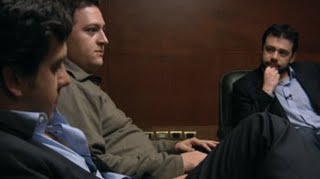 [PREMIERE SCREENING: Friday, Jan. 22, 9:00 pm -- Holiday Village Cinema IV, Park City] My biggest challenge was daring to make this documentary, which from the very beginning was almost an impossible idea. On one hand, we set out to retell Pablo Escobar’s story, not as yet another gangster film, which it isn’t despite popular perception, but as an intricate political thriller. On the other hand, we challenged the longstanding belief in Colombia that violence and hate pass from generation to generation. The intellectual challenges behind these two ideas were actually more difficult than getting Escobar’s son back into Colombia to meet with the sons of his father’s most prominent victims, even though this demanded contacting some of the Escobar’s old enemies.
# posted by Jason Guerrasio @ 3:00 PM
SPLICE |
co-writer-director, Vincenzo Natali
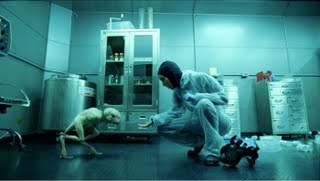 [PREMIERE SCREENING: Friday, Jan. 22, 11:59 pm -- Egyptian Theatre, Park City] With any independent film there is a point where limited budget requires hacking off a limb or two to get to the finish line. But in the case of Splice, which stars a humanoid creature, there was a price tag associated with removing body parts (it was a costly special effect). Much of my time in post was spent deciding what visual effects shots could be deleted to lower the budget. At the time it felt like death from a thousand cuts, but as is often the case with these things, it had a positive effect on the overall film. It forced me to think economically and remove any shot (or part of a shot, every frame has a dollar value) that wasn’t absolutely essential to telling the story.
# posted by Jason Guerrasio @ 3:00 PM
BRODERTOWN |
Tracey Snelling
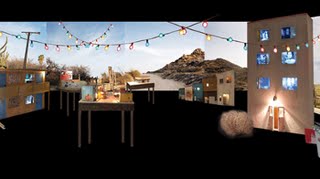 [New Frontier Performances and Installations] With my artwork, the hardest decision seems to be how much detail I should add to a work. The more detail added, the more fleshed out the work is. Yet by keeping the work simple and only having necessary and particular details, there is more room left for the viewer to bring their past experiences and ideas to the interpretation of the work. This is a fine line I constantly ride with my work, sometimes purposely deviating one way or another to push the boundaries. In my installation Bordertown the combination between highly detailed works and more simple pieces allows for a balanced tension that helps to keep one immersed and involved in the environment.
# posted by Jason Guerrasio @ 1:00 PM
HOMEWRECKER |
co-writers-directors, Todd Barnes & Brad Barnes
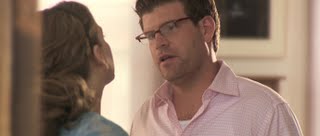 [PREMIERE SCREENING: Friday, Jan. 22, 3:00 pm -- Yarrow Hotel Theatre, Park City] The summer decision to actually get started, to set the date for Homewrecker, was the most difficult on this project, so we did the only responsible thing: We had somebody else make it. Another project that seemed to be on the verge of total funding fell through for us in June. On June 25, we met and had the same conversation we’ve had each summer for years: Are we or are we not going to make a movie this summer? A childhood friend in Singapore, Todd McDonald, had always said he’d help us out if we ever decided to make a feature. So we e-mailed him asking if he’d like to invest in a film. We told him nothing about the story, the actors or the possible schedule. If he said “no” or seemed ambivalent, we were going to shoot another corporate video or make beach plans. In 15 minutes he replied, “I’m in.” We were shooting on July 27.
# posted by Jason Guerrasio @ 1:00 PM
HIS & HERS |
director, Ken Wardrop
 [PREMIERE SCREENING: Friday, Jan. 22, 3:00 pm -- Holiday Village Cinema IV, Park City] I had many difficult decisions to make from the conceptual to the production stages of our documentary His & Hers. These decisions were primarily concerning our small budget of €100,000 and my choice to shoot on film. However I think the hardest decision of all was actually to make the film in the first place. In all honesty, the producer actually had to coax me into making it. Okay, I wasn’t exactly kicking and screaming but I definitely needed the push. You see, up until now I had been making short films, and I’d started to believe I would never go beyond 10 minutes. I think one would call it a “crisis of confidence.” Fortunately Andrew Freedman, my producer, doesn’t suffer from that aforementioned problem and was determined that I’d make the film. Before I knew it we were in pre-production. Thank you, Andrew.
# posted by Jason Guerrasio @ 12:00 PM
ANIMAL KINGDOM |
writer-director, David Michod
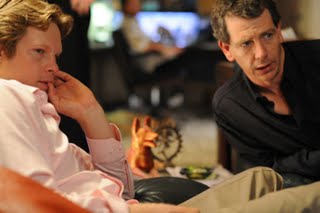 [PREMIERE SCREENING: Friday, Jan. 22, 9:00 pm -- Egyptian Theatre, Park City] Casting 17-year-old James Frecheville in the lead role. He’d never done a movie before; he was just one of 500 kids who came to a massive open casting. He was bigger and tougher than I’d ever imagined the character being and he was going to have to sit at the center of a big ensemble cast of some of the best and most intimidating actors in Australia. If he didn’t work, the movie wouldn’t work. But something about the natural detail in his audition performances just made me want to cast him. And the more I thought about him in the role, the more the movie made sense: What was sad about this character was not that he was a little fragile kid in a dangerous world, but that he was like a man-child in this world — big, naive and lonely. It made sense that he might find himself involved with hardened criminals but way out of his depth at the same time. And so we took the plunge, gave him the part on Christmas eve and every day during the shoot he surprised me. I could direct him the same way I could Ben Mendelsohn or Guy Pearce or Jacki Weaver. And never during the edit did I feel like we were having to cut around him to build a believable performance. Casting Jimmy felt like a hard decision at the time, a scary decision. It almost felt like we had no other options. But then very often that’s how the No. 1 choice presents itself to you — it makes you feel like you have no other option.
# posted by Jason Guerrasio @ 12:00 PM
OBSELIDIA |
writer-director, Diane Bell
-789976.jpg) [PREMIERE SCREENING: Friday, Jan. 22, 2:15 pm -- Racquet Club, Park City] Without a doubt the most difficult decision I made was to trust my instincts. That might seem like an easy thing to do, but given I had never made a movie before (not even a short), it was truly a daily leap of faith. Along the path I encountered many people with years of movie-making experience telling me how I should do it, and if I had listened to them, I probably still wouldn’t have made a movie! In fact, I’d still be trying to raise a larger budget and attach name actors. Instead, I trusted my inner voice, took some crazy risks, and went with my heart at every point. The result? I had a magical and deeply fulfilling experience making a movie with a bunch of amazingly talented people that I love and we are now heading to Sundance. Photo By: Zack Mulligan
# posted by Jason Guerrasio @ 12:00 PM
MEMORIES OF OVERDEVELOPMENT |
writer-director, Miguel Coyula
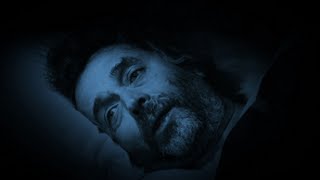 [PREMIERE SCREENING: Friday, Jan. 22, 12:00 pm -- Holiday Village Cinema IV, Park City] The hardest decision was to steer Memories of Overdevelopment into a new direction. The first version of the script was pretty much a synopsis of the novel Memorias del Desarrollo by Edmundo Desnoes. But as shooting and editing started, new ideas emerged. Slowly the film took on a life of its own, with the inclusion of new scenes, characters, sociopolitical angles, animation sequences, etc. The result is a hybrid of the visions of two different generations of Cubans: one born before the Revolution, Edmundo Desnoes, and one born inside of it, myself. It spans more than 50 years of history within both Cuba and within the U.S. — histories remembered in parallel to the personal life to the protagonist (and filtered through his cynicism). The irony is that my films up to this point have been devoid of political-historical context. However in this film I felt compelled to delve into these subjects because I believed it was for the benefit of the film itself. Putting myself in Edmund Desnoes’s shoes, I know I would not have liked for somebody to transform my work. But these choices resulted in a multilayered film, much richer than what I had intended in the early stages of its making. (Note: Desnoes wrote the 1960’s novel Memorias del Subdesarrollo, or Memories of Underdevelopment, which was the basis of the 1968 Cuban film of the same title directed by Tomás Gutiérrez Alea. Coyula’s is a follow-up to Gutiérrez’s original film.)
# posted by Jason Guerrasio @ 12:00 PM
CATFISH |
co-directors, Henry Joost & Ariel Schulman
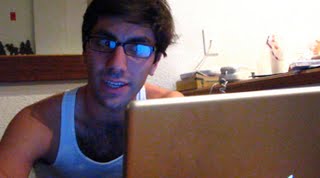 [PREMIERE SCREENING: Friday, Jan. 22, 11:30 am -- Library Center Theatre, Park City] Our film was a slow burn. It took eight months for the true story to emerge. The last two-thirds of the film unfold over the course of one incredible week. Our toughest decisions came in the editing room, trying to distill the most exhilarating, unsettling and ultimately revelatory week of our lives into an hour and a half.
# posted by Jason Guerrasio @ 9:00 AM
ONE TOO MANY MORNINGS |
co-writer-director, Michael Mohan
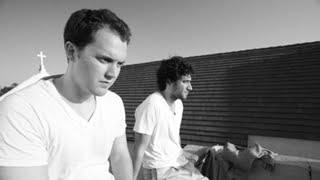 [PREMIERE SCREENING: Friday, Jan. 22, 6:00 pm -- Yarrow Hotel Theatre, Park City] The hardest decision we had to make actually happened prior to shooting. During 2007, my team and I had been commissioned to write a horror-comedy script. We had been working on the script for many months and actually had the budget to make it. At this moment, we were on the verge of going to our bosses and trying to figure out how we could take leave of absences from our jobs to go film this movie in the late summer. At the time I was working in the Sundance Feature Film Program — the Screenwriting and Directing Labs. I wasn’t one of the directing fellows. I made copies. But it was still incredible; it was like auditing the most intense grad school. As part of the Screenwriters Lab, Stewart Stern ( Rebel Without a Cause) leads this life-changing workshop about writers’ personal connections to their work. It’s really heavy: His philosophy is that we’re all defined by the sum total of our experiences. And as a writer, you need to acknowledge and share those experiences so that your work is wholly unique to you and your audiences. During that workshop I had a miniature crisis where I realized that while I was intellectually invested in this story, I wasn’t emotionally invested. And in staring at this long year ahead of me, knowing that I was going to pour as much of my life into this project as humanly possible, I decided that I would rather not make a movie at all than tell a story that wasn’t me. So we pulled the plug. My team and I regrouped in the late summer, knowing we could have been on set at that very moment. We were “this close” to making our first feature film, and now we couldn’t be further away. We had nothing. So we sat in a room, looked within ourselves, and wrote. It was the best decision we could have ever made.
# posted by Jason Guerrasio @ 9:00 AM
TEENAGE PAPARAZZO |
director, Adrian Grenier
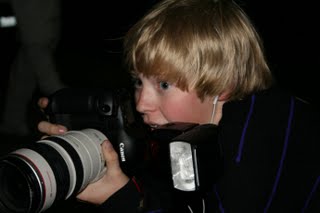 [PREMIERE SCREENING: Friday, Jan. 22, 5:15 pm -- Racquet Club, Park City] The hardest decision I had to make was to completely scrap the first cut of the film, start from scratch and completely redo a year and a half of work. After I turned in the film I was still not satisfied, but my investors didn’t want to give me more time or money. There were two choices: wash my hands of it or take drastic measures and defy the will of my investors to go over budget and over schedule. I had no idea if I would succeed in making the film better or if it was worth risking a lawsuit, but I decided to recut the film and take the movie in an entirely new direction. It took me another year to finish the film as it stands. I am much more satisfied with this version and creatively it was worth it. But of course success in this business is not only artistic; I will be completely satisfied with my decision once my investors make their money back.
# posted by Jason Guerrasio @ 9:00 AM
A SMALL ACT |
director, Jennifer Arnold
-784516.jpg) [PREMIERE SCREENING: Friday, Jan. 22, 12:00 pm -- Temple Theatre, Park City] The documentary project A Small Act follows five main characters through two interlocking storylines, but we only had one camera. We were constantly forced to decide which story, and which character within the story, to follow. There was one day in particular that we absolutely needed to be in three places at once, which was impossible of course. We were filming three Kenyan students as they competed for a life-changing scholarship. The students had taken a national exam and the exam score determined their scholarship eligibility. If they did well on the test, they could get sponsored and continue with school. If they failed, their educations were over and they would spend their lives doing manual labor. I knew the film’s success was totally reliant on catching the kids’ reactions as they saw their scores. In the past, students would get their exam results at school, meaning in one location. But this year, results were available by text message. Suddenly we had main characters in different locations, each one texting away. The choices were: stay in one place, knowing we would have at least one solid scene on camera; or risk it and drive back and forth between locations, hoping to catch multiple kids get their scores, but knowing we could miss all three big moments completely. I risked it and the footage we shot that day absolutely makes the film. Photo By: Patti Lee
# posted by Jason Guerrasio @ 9:00 AM
happythankyoumoreplease |
writer-director, Josh Radnor
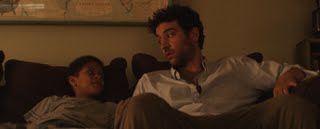 [PREMIERE SCREENING: Friday, Jan. 22, 12:15 pm -- Eccles Theatre, Park City] Well my first impulse is to list the obvious: casting woes, scheduling conflicts, clashes over time and locations, cherished scenes that ended up getting cut in editing, and the like. But the overall feeling I’m left with on the other side of the freefall that was directing my first film is that the hard decisions weren’t all that hard. One hears so much about the rigors/horrors of filmmaking, and as a fairly suggestible person when facing the unknown, I was kind of prepared for the worst. But the strangest and most wonderful thing happened: Everything worked itself out. That’s not to say there weren’t freak-outs and arguments and moments of nail-biting suspense (i.e. “If we don’t get this shot the movie is ruined!”). But by and large, the big things revealed themselves to be not so big. It confirmed a theory of mine: The idea of something going wrong is more terrifying than something actually going wrong. A problem would arise, we’d deal with it, and then we’d move on to the next problem. This happened roughly 100 times each day. I told people at the outset that there was no point in having a toxic, dysfunctional set when we were making a movie called happythankyoumoreplease. I really feel like something about the whimsical weirdness of the title put everyone in a fairly up mood. There was an ease and lightness of touch about the whole process: The right people and solutions always seemed to magically materialize at the right moments, which was initially unsettling. Wait, I thought, it’s not supposed to be like this. But it was. That’s not to say it wasn’t the most exhausting, overwhelming experience of my life. Because it was also that. It’s just I was unprepared for the fact that it would also be so intensely joyful. The hard decision, I suppose, came in accepting that making one’s first movie didn’t have to be an exercise in agony and terror, that it wasn’t destined to all come crashing down around me, that I didn’t need to reflexively allow other people’s filmmaking war stories to become my own. In short, making the conscious choice not to freak the fuck out. It was ultimately an exercise in faith — trusting that things were unfolding exactly as they should… and saying “yes” to it. Which, come to think about it. is really what happythankyoumoreplease is all about.
# posted by Jason Guerrasio @ 9:00 AM
LOURDES |
writer-director, Jessica Hausner
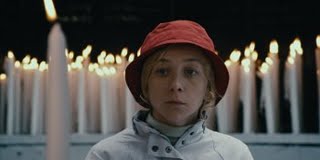 [PREMIERE SCREENING: Friday, Jan. 22, 2:30 pm -- Prospector Square Theatre, Park City] For Lourdes the hardest decision was whether to make the film at all. This decision was so hard because I found the subject very ambivalent and difficult to treat. I wanted to tell a story like a fairytale but I didn’t want to make a naive film. I wanted to question religion and faith but I also really wanted to know and learn more about both without, on the other hand, being too soft with the Catholic Church. I wanted to make a film in Lourdes that talks about a miracle without pretending that God exists and that he is a good man. But I also didn’t want to exclude the possibility of God’s existence and judge the Catholic religion for selling God’s ideas. I wanted to tell a more general story about the longing for happiness and it’s decay. I wasn’t sure if it could work — if the film would be too friendly towards the church, or too atheist towards the miracle. I myself am not a believer, but I once was one. Would I have enough distance to be able to tell this story? I finally decided to make the film — it was much due to Sylvie Testud. She brought a dry sort of humor into her role, which helped me to find the tone to tell the film. The difficulties in making this decision finally helped the film to become what it is now. It shows different aspects and doesn’t really judge. That was hard enough!
# posted by Jason Guerrasio @ 9:00 AM
THE TUNNEL |
writer-director, Jenna Bass
 [PREMIERE SCREENING: Friday, Jan. 22, 12:00 pm -- Yarrow Hotel Theatre, Park City] Never a truer word. We had a scene — it was my favorite in the film. It was one of those scenes which didn’t necessarily drive the film on a plot level but was essential to the feel and the magic. Like everything, it was shot in a huge rush. When it came to the editing, we tried everything to make it work, but eventually we had to admit: It was bad. There was no way the scene was going to cut it. There was no way I could afford a reshoot; it was a scene with lots of extras (part of the reason it failed in the first place), and the camera rerental alone meant it was impossible. Without it there, the film played, but there was definitely something missing. So I sat and thought — tears of frustration drying in my eyes — what could I replace it with? It had to be something that cost no money and which I could do myself (as it was at that stage of postproduction where everyone has abandoned you. Except, if you’re lucky, your editor). And then it hit me: animation. Sand animation to be precise. Had I done sand animation before? Okay no, but really, I couldn’t think of anything else. I’m never sure exactly where ideas come from, but in this case I know: from the depths of pure terror and desperation. How sand animation fits in with the film is a long story, but believe me, it did. I tried to construct a sequence that would have the same impact as the original live action scene. It became more and more simplified as I realized the potential difficulties of the medium. But what we ended up with is one of my own and, dare I say, other’s favorite moments in the film.
# posted by Jason Guerrasio @ 9:00 AM
GROWN UP MOVIE STAR |
writer-director, Adriana Maggs
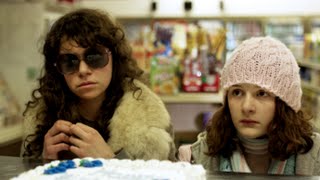 [PREMIERE SCREENING: Friday, Jan. 22, 6:45 pm -- Broadway Centre Cineams, Salt Lake City] Casting the central role of Ruby was really tough. In my mind Ruby was a scary mix of too young and too sexy, even in her appearance. I wanted to create a tension and innocence of youth conflicting with too much skin. I wanted someone from Newfoundland, someone wild, messy, damaged and young. I wanted her to have physical flaws, like maybe not perfect teeth, something physical that would put a definite wall between herself and her dreams of stardom. Shawn loved Tatiana and wanted her to play the role, but I met her. She was none of those things. She was from the Prairies; she was beautiful, older than the character and very together as a person. Because I was dealing with issues of underage sexuality I was worried about casting someone who looked old enough to handle herself in the situations I was about to throw her in. This was when Tatiana kind of taught me what acting was. She owned the character the minute she auditioned. Ruby became someone new. A collaboration between myself and Tatiana. Tatiana brought an effervescence that I didn’t think about. She gave levity to the tragedy of the film and a playfulness to the sexuality that actually ended up creating more tension, perhaps, than an audience would experience watching a messed-up girl just get more messed up. This, in retrospect, would have been pretty bleak. I actually had to really think about this question because the film is a product of a million decisions all tangled up together. It is terrifying now to look back and extract one from the mix. I shudder to think of the movie without Tatiana in that role.
# posted by Jason Guerrasio @ 9:00 AM
FAMILY AFFAIR |
director, Chico Colvard
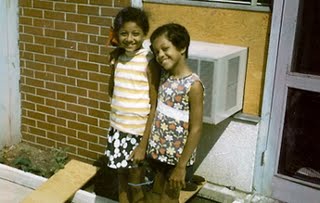 [PREMIERE SCREENING: Friday, Jan. 22, 3:00 pm -- Temple Theatre, Park City] The hardest decision I made in making Family Affair was to ask my father the question, “Why?” When my father was arrested, I was 10 years old. It wouldn’t be until much later in life that I’d come to comprehend the full magnitude of the crimes he committed against my sisters. For reasons I once could not understand, my sisters had maintained a relationship with my father almost immediately following his release from prison. In November of 2002, my sisters invited me to spend Thanksgiving with them in Kentucky, so I decided to bring along my camcorder. It was only after I arrived that I learned my father was joining us and that this would be the first time I’d see him in nearly 15 years. Although I didn’t know it, this would also be the start of my documentary, Family Affair. I’d always imagined that if I ever encountered my father after all those years, I’d confront him and ask, “Why did you molest my sisters and destroy our lives?” But when he walked through the door, I watched my sisters, family and neighbors warmly greet this man I had come to see as a monster. At the same time, I felt myself digress in his presence from a grown man to a terrified little boy. As he walked toward me and filled the lens with his ailing body, all I could do is hide behind the camera and say, “How are you?” I left for Boston feeling like a coward — ashamed that I couldn’t find the courage to confront my father. I was equally puzzled as to why my sisters were accommodating this man — laughing at his jokes, spending time with him on special occasions and effectively comply in creating the illusion of a healthy father-daughter relationship. When I first started interviewing my father, I knew that I had to ask him why he molested my sisters. But I also knew that my father possessed the power to derail the project by simply saying, “I don’t wish to participate.” He could opt out, not sign a release form and ask that the cameras stop rolling. So for years I’d show up with my camera and simply gather as much background material on my father as possible — his childhood, mother, military days, marriages and so on. I kept waiting for him to bring up the issue, but that never happened. Finally I got a call from my sister saying that our father was in the hospital and that he might not make it. I went to visit him filled with anxiety and camera in hand. I got permission from the hospital to film and realized that this may be my last chance to ask, “Why?” After five years of skirting around the question, I finally did ask and suddenly the hold he had over me was immediately lifted. I was 39 years old at the time, but it was the first time in my life when I truly felt like a man. I had always imagined this exchange as one that would be contentious, either in his response or my reaction to his response. This scene in the film is crucial, but not how I initially envisioned it playing out. In the film, we hear me ask the question and him start to explain — just as I slowly lower the volume on his response. Some people during rough-cut screenings have commented that they wanted to hear everything he had to say. But for me the scene is more powerful when we don’t hear him attempt to justify what he did — “the drugs” or how “a black man was under so much pressure back then.” I wanted the scene to unfold for the audience in the same way I experienced standing there in the hospital room: realizing that asking the question was more important than anything he could say.
# posted by Jason Guerrasio @ 9:00 AM
DADDY LONGLEGS |
co-writers-directors, Benny Safdie & Josh Safdie
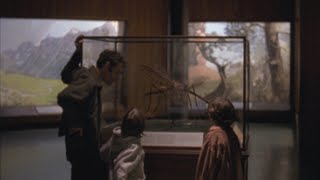 [PREMIERE SCREENING: Friday, Jan. 22, 8:30 am -- Prospector Square Theatre, Park City] Jeesh, the amount of decisions that go into making a movie… the words “the amount” are so heavy because the list is heavy, breathing is a decision, but to quantify them seems like the scariest task with such a daunting overhead. Of course the best decisions are the ones that you don’t have to make but are forced into. During Daddy Longlegs, we were so preoccupied with constantly providing stimuli from the writing process all the way through editing: for ourselves, for the actors, the non-actors, the producers and ultimately the film. For some reason, during one of the first all-encompassing scenes with the children, where we expected very specific actions and emotions from them, we forgot about this concept (of letting the stimuli direct the film and always be humbled by it). We embarked on our first real scene in this apartment we had been working on for months (another important decision was to allow the apartment set itself be the only real outlet for sentiment, which we did with production design by filling it with emotional baggage: a museum of New York childhood sentiment and of our fathers). The scene involved introducing Lenny’s girlfriend to the kids in a loving way. Our strategy involved a tablecloth scarf and a live lizard hiding and slowly dying in a Petri dish within a resealed box of Lucky Charms. What we hadn’t planned was the clash of adding a woman or an outsider to the intimate stimulus we had been building from day one. We forced the kids to forge this ridiculously unhealthy relationship with Ronnie where he was having fun and playing games 24 hours a day. The thought had never crossed our minds that adding a girl to the scene was the equivalent of killing the sleepover. Needless to say the kids revolted and the scene was thrown to the wolves. We tried to save the original idea by telling them how they should react, but we got wooden performances, and we weren’t making Pinocchio so it was a problem. The problem wasn’t a lack of stimuli but our underestimation of its power. We should have rolled with it and instead we tried to stand above it from a safe place. We tried to direct the kids with our mouths. To tell them what they were doing. We forgot! Before the lizard was out the box (literally), we knew we had to stop. The scene was trashed; we cut and didn’t shoot anything that day. Instead we all hung out and watched some of our old VHS tapes and ate dinner. That night we sat down with Ronnie and Eleonore and replanned that complicated scene, this time with chapter marks highlighting different actions Sage and Frey (the two children in the film) may or may not do, according to what was thrown at them. What was so unique about this sit-down was that this was our first attack plan that formed out of a failed attempt (not a rehearsal but a burnt film attempt). It was the product of a fresh decision to not shoot a scene through and stop before the nuances were out in the open.
# posted by Jason Guerrasio @ 6:00 AM
Thursday, January 21, 2010
THE END |
Ragnar Kjartansson
 [New Frontier Performances and Installations] When it comes to shooting one is faced with endless decisions. I make them like when playing a computer game or making music — really quick and without too much thinking. I make up my mind really fast just so I won’t lose my cool with my crew. Afterward I think, “What the hell was that decision?” But then in retrospect it usually works out well. Instinct is the only thing an artist can truly trust when it comes to those decisions. If the vision is clear then instinct will follow.
# posted by Jason Guerrasio @ 3:00 PM
Wednesday, January 20, 2010
THE CLOUD MIRROR |
Eric Gradman
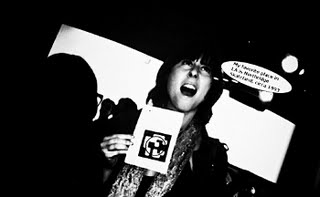 [New Frontier Performances and Installations] The Cloud Mirror is a technological exploration of how our online standards of privacy and tact contrast so dramatically with those standard in the real world. When building The Cloud Mirror, I had to consider whether I felt comfortable taking people’s information from Facebook and Twitter and splashing it on their faces in a real public space for all to see. I found I felt uncomfortable with invading people’s privacy in this way, even though they themselves had made the information public. In fact I discovered people who post their “relationship status”" publicly on Facebook are highly likely to laugh when they see it in The Cloud Mirror. The small minority who do find it offensive react in a very satisfying way. My great hope is that The Cloud Mirror creates an awkward scene at the New Frontier exhibit. If someone gets slapped, I promise it will be captured by The Cloud Mirror.
# posted by Jason Guerrasio @ 3:00 PM
Tuesday, January 19, 2010
DOUCHEBAG |
co-writer-director, Drake Doremus
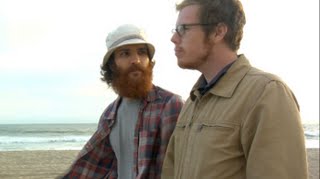 [PREMIERE SCREENING: Friday, Jan. 22, 8:00 pm -- Racquet Club, Park City] The shooting of this movie was insane. We shot three different times over the course of almost two years. The first time we worked with an outline and the actors completely improvising from that outline. The second time we had some scripted scenes, and the third time we went in completely scripted. With all that shooting I had a crazy amount of material to work with, and it was really hard to cut certain scenes that I loved. The hardest decision was because we shot so much, I had two completely different scenes for the ending of the film, and for many weeks I struggled with how to conclude the movie. Why was it so difficult? It’s interesting. I think having a locked script and not having the actors improvise as much is a much easier way to make a film. Having too many options can be completely nerve-racking. I think in the end the movie has the best ending we could have made out of the two options, and that makes it easier to sleep at night.
# posted by Jason Guerrasio @ 5:02 PM
LIFE 2.0 |
director, Jason Spingarn-Koff
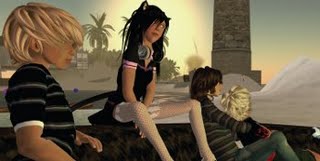 [PREMIERE SCREENING: Friday, Jan. 22, 2:30 pm -- Library Center Theatre, Park City] Do I need permission to film that person? In my previous documentaries, the answer was always clear: get a signed release form. But this film was set in a different world: a virtual world called Second Life, populated solely by digital avatars. Was this a game or a place governed by the laws of the real world? To make things more complicated, most “residents” (as the users call themselves) fiercely guard their real identities, adopting fanciful new names, ethnicities, nationalities, genders, even species. Asking for a resident’s signature and real name often felt like trying to unmask a CIA operative. It was soon clear that I needed some ace legal advice. I contacted an attorney at the Electronic Frontier Foundation who recognized this as novel legal territory and offered to take on my film pro bono. Ultimately we made an interesting decision, with the goal of notifying as many people as possible about my intent: My avatar would carry around a virtual video camera and wear text that signaled I was making a documentary. If anyone clicked on me, they’d get a description of who I was, how the footage would be used, and a way to opt out. I also did my best to seek explicit permission via text chat or, when an avatar was prominently featured, digital release forms. Even if the person would only sign as “Decomposing Monster.”
# posted by Jason Guerrasio @ 5:01 PM
RESTREPO |
directors, Sebastian Junger & Tim Hetherington
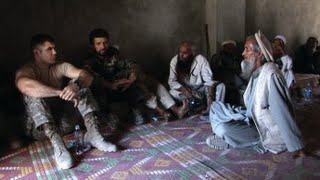 [PREMIERE SCREENING: Thursday, Jan. 21, 9:30 pm -- Eccles Theatre, Park City] Our goal in making Restrepo, a documentary about soldiers at a remote outpost in Afghanistan, was to give viewers the experience of a 90-minute deployment. We had no difficult decisions, per se, but we did have important ones. First and foremost, we decided that our cameras would never leave the soldiers. We would not interview generals or diplomats; we would not return to the United States to talk to the families. We would limit ourselves to what the soldiers had access to and nothing more. Finally our film would have no political agenda or moral viewpoint... it would simply be a starting point for the complex and painful debates that surround any use of military force. This is war, full stop. The rest is up to you.
# posted by Jason Guerrasio @ 5:00 PM
THE WORKS OF MICHAEL JOAQUIN GREY |
director, Joaquin Grey
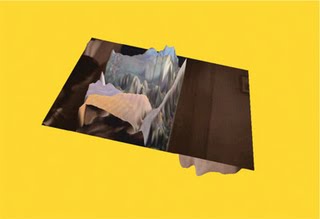 New Frontier Performances and Installations [PREMIERE SCREENING: Thursday, Jan. 21, 3:00 pm -- New Frontier on Main, Park City] Not filming anything, I developed software that breaks down film as video into its basic primitives — the building blocks of media. I take body signals and sound to reanimate and dematerialize existing media and create film objects and “dream anatomies” of our familiar media body. These computational cinema works are not recorded; they are generated as the viewer experiences the work in real time. The works synchronize with your own body to create new synesthetic experiences.
# posted by Jason Guerrasio @ 4:59 PM

|







-797823.jpg)









-727925.jpg)


-767969.jpg)
-763713.jpg)


-704508.jpg)




-741605.jpg)
















-766610.jpg)


-763008.jpg)









-789976.jpg)




-784516.jpg)











